【外语学习】实用英语语音学 电子教案c3
英语语音教案
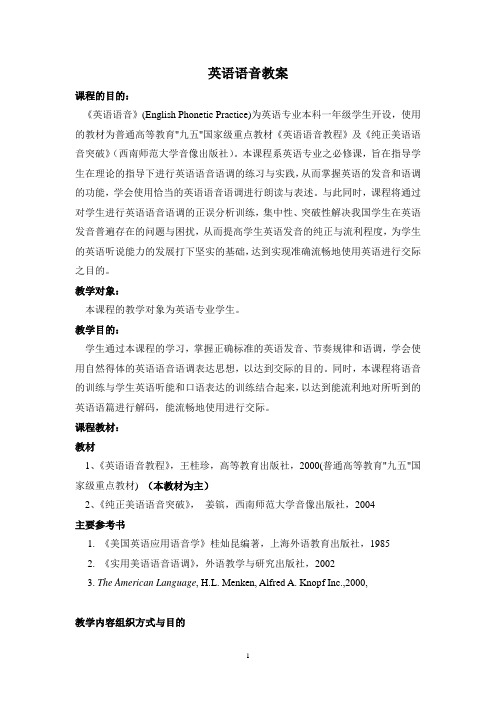
英语语音教案课程的目的:《英语语音》(English Phonetic Practice)为英语专业本科一年级学生开设,使用的教材为普通高等教育"九五"国家级重点教材《英语语音教程》及《纯正美语语音突破》(西南师范大学音像出版社)。
本课程系英语专业之必修课,旨在指导学生在理论的指导下进行英语语音语调的练习与实践,从而掌握英语的发音和语调的功能,学会使用恰当的英语语音语调进行朗读与表述。
与此同时,课程将通过对学生进行英语语音语调的正误分析训练,集中性、突破性解决我国学生在英语发音普遍存在的问题与困扰,从而提高学生英语发音的纯正与流利程度,为学生的英语听说能力的发展打下坚实的基础,达到实现准确流畅地使用英语进行交际之目的。
教学对象:本课程的教学对象为英语专业学生。
教学目的:学生通过本课程的学习,掌握正确标准的英语发音、节奏规律和语调,学会使用自然得体的英语语音语调表达思想,以达到交际的目的。
同时,本课程将语音的训练与学生英语听能和口语表达的训练结合起来,以达到能流利地对所听到的英语语篇进行解码,能流畅地使用进行交际。
课程教材:教材1、《英语语音教程》,王桂珍,高等教育出版社,2000(普通高等教育"九五"国家级重点教材) (本教材为主)2、《纯正美语语音突破》,姜镔,西南师范大学音像出版社,2004主要参考书1. 《美国英语应用语音学》桂灿昆编著,上海外语教育出版社,19852. 《实用美语语音语调》,外语教学与研究出版社,20023. The American Language, H.L. Menken, Alfred A. Knopf Inc.,2000,教学内容组织方式与目的课程各个单元的编排由以下几个部分组成:1.英语语音知识的简单介绍;2.听辨、听力训练;3.发音、口语训练;4、重音模式和语调模仿训练;5、检测实际使用能力的训练,即以完成某项任务为手段的交际练习。
英语语音课程教案
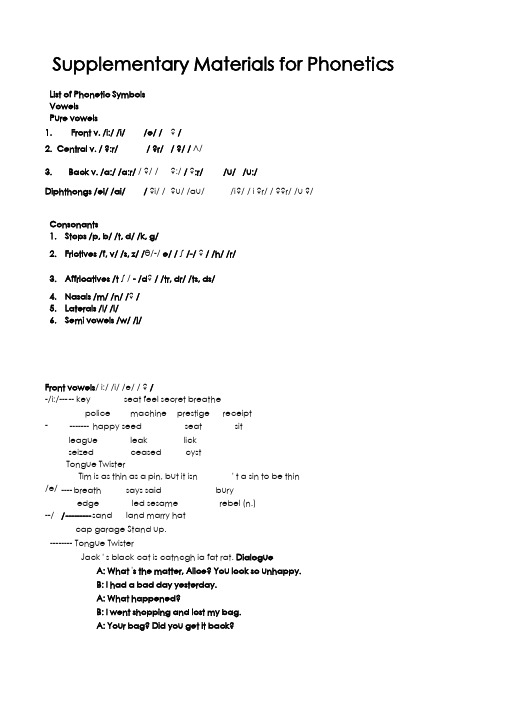
Supplementary Materials for Phonetics List of Phonetic SymbolsVowelsPure vowels1.Front v. /i:/ /i//e/ /? /2.Central v. / ?:r// ?r// ?/ / Λ/3.Back v. /a:/ /a:r/ / ?/ / ?:/ / ?:r//u//u:/Diphthongs /ei/ /ai// ?i/ / ?u/ /au/ /i ?/ / i ?r/ / ??r/ /u ?/Consonants1.Stops /p, b/ /t, d/ /k, g/2.Frictives /f, v/ /s, z/ /θ/-/ e/ /∫/-/ ? / /h/ /r/3.Affricatives /t∫/ - /d? / /tr, dr/ /ts, ds/4.Nasals /m/ /n/ /? /terals /l/ /l/6.Semi vowels /w/ /j/Front vowels/ i:/ /i/ /e/ / ? /-/i:/--- -- key seat feel secret breathepolice machine prestige receipt-/i://i/------- happy seed seat sitleague leak lickseized ceased cystTongue TwisterTim is as thin as a pin, but it isn ' t a sin to be thin/e/ -- ---- breath says said bury edge led sesame rebel (n.)--/ / --------- sand land marry hatcap garage Stand up.-------- Tongue TwisterJack ' s black cat is catncgh ia fat rat. DialogueA: What 's the matter, Alice? You look so unhappy.B: I had a bad day yesterday.A: What happened?B: I went shopping and lost my bag.A: Your bag? Did you get it back?B: I went back for it. But it was already gone.A: That 's too bad. I'm sorry to hear it.Back vowels /a:/ /a:r/ / ?/ /?:/ / ?:r/ /u/ /u:/-/a:/ --- --calm palm Chicago moustache na?ve-/a:r/--- ---car cart card heart park hard large pardon hectare part-/ ? /-- ---- W hen the letter “ a ”appears in front of one ofthe following letters, it is pronounced as / ? /. -ss; -st; -sk; -th; -f; -lf; -m; -n; -gh /s/ /θ/ /f/ /m/ /n/ glass-class-pass; fast-last-master-vast-past; ask-task-basket; path-bath; after-staff-draft; half-calf; command-demand dance-chance-advance-advantage-plant-aunt- branch-answer-can' t; laugh-draught-------- Martin 's aunt is taking a -sbuanth in the afternoon.The dance party in the farmyard lasted far into the night. After class, half of the students went out of the classroom. “ You want to lose the chance? ” the teacher asked.Time passes very fast.-/ ?/ ----- cough because sausage Australiaknowledge sorry wander --- wonder- Lots and lots of clocks and watches are on sale in the shops.-/ ?:/ ------- a ll of us almost always also-/ ?:r/ ------- G eorge had four daughters born in autumn.horse more door four morning -/u:/ /u/ new duty Tuesday produce tomb-------- It ' s Clo o At noon I took a book, And sat by the pool near the school. I soontook off my shoe, And put my foot in the pool. Oh, how cool!A: George, what're you gonna do tomorrow?B: John and I plan to play hockey in the morning.A: And in the afternoon?B: Well, after a long nap, we'll go yachting with Monica.A: You're sure to have a nice day tomorrow. B: What 're you gonna do?A: Lots of wok in the office and lots of chores at home. How I envy you, George.Central vowels / ?:r/ / ?r/ / ?/ / Λ/ -/ ?:r/ desert-dessert-/ ?r/ ----- S aturday yesterday effort better-/ ?/ ----- a bout again panda China sofaAustralia breakfast possible famous delicious campus -/ Λ-/ sun son country southern double blood does love courage cousin tongue housewife muscle oven stomach I gave her some peals for her thirty-first birthday.Father and mother gathered the butter together. Martha doesn ' t like to go to the cinema or the theatre. She prefers the concert Hurry up! The sun has come up. Don ' t touch the muddy duck.-------- T ongue Twister Once upon a barren moor there dwelt a bear, also a boar.The bear couldn ' t bear the boar, the boar thought the bear a bore. At last, thebear could bear no more that boar that bored him on the moor. And so one mornhe bored the boar. That boar will bore the bear no more.Dialogue:A: Were you ever hurt in an accident?B: Yes, once. I hurt my head, and Igot a burn on my leg. A: Were you taken to the emergency room?B: Well, a person help me get there. Then the doctors and nurses were certainlyconcerned. So I survived.A: You were really lucky, weren 't you?Diphthongs/ei/ /ai/ / ?i/ / ?u/ /au//i ?/ / i ?r/ / ??r/ /u ?r/ -/ei /---------halfpennychange steak ballet bouquet-/ai/ -- ---- aisle isle height either neither minute diary-dairy- / ?i/ - ---- boy noiseoilemploy-/ ?u/ go no-/au / ------ down townbrow frown bow house bowel doubt drough-found ---- f onddown --- donpound --- pond town --- ton-/i ?/ ----- idea theatre museum-/ i ?r/--- - hear here ear-/ ??r/ bear ----- beard ---- m oustachepear -- pearl ----- t ear (n.) ---- tear (v.) -----mayor -/u ?r / ---- t ouristPlosives/ Stops /p /- /b/ -/p/ --- peak happy -/b/ --- spin Spain -------- captain top boy -------- cap --- cabTongue TwisterPeter Pepper picked up a peck of pickled peppers.Did Peter Pepper pick up a peck of pickled peppers? If Peter Pepper picked up a peck of pickled peppers,Where is the peck of pickled peppers Peter Pepper picked up. -/t/--- --too task tie -/d/--- --steak stone start -football that day great joke Good morning!Water better butter Peter Betty forty Betty bought a bit of better butter. But said she: “This butter is bitter. It'll make my batter bitter.”Fricatives /f/ -/v/ /s/ -/z/ /θ/-/ e/ /∫/-/ ? / /r/ /h/--/f//v/ --- five view--------- Forty fat farmers found a field of fine fresh fodder.Now, if the forty fat farmers found a field of fine fresh fodder, Where is the field of fine freshfodder those forty fat farmers found. -/s//z/ seize -/θ // -e / ----- think thank thought these those--------- Neither my mother nor my father likes this weather. -/∫/-/ ? / ----- she shell shore--------- She sells seashells on the seashore,And the shells she sells are seashells, I' m sure.‘ cause if she sells seashells on the seashore, The shells she sells are seashells for sure.-/r/ ---- spring scream for ever far away there is ----- Robert Rolly rolled a round roll around.If Robert Rolly rolled a round roll around , Where is the round roll Robert rolled around. Laterals /l/ /l/-/l/ ---- love glad only failure million sleep -/l/ ---- feel girl help world almost Nasals /m/ /n/ /? /-/n/ ------- snow --- slow now ------------------------- loud---- The next number is neither nine nor ninety-nine, but nine thousand nine hundred and ninety-nine. -/n/-/? / ----- s in ---- sing thin ------------- thing son ------------- song --singersingingsing a song/t/- /d/ /k/ -/g/rapidsport whisper cheap cheese mop --- mobrespectThe Old Man is SnoringIt ' s raining. It 's singing.The old man is snoring.He jumped into bed.And bumped his head,And couldn ' t get up the next morning.Affricates /t ∫/ - /d? / /tr/-/dr/ /ts/-/ds/-/t ∫/ --- China cheap choice choose chose chosen-/d? / ---- Our Joe wants to know if your Joewill lend our Joe your Joe ' s banjo.If your Joe won 't lend our Joe your Joe ' s banjo,Our Joe won ' t lend your Joeour Joe ' s banjo when our Joe has a banjo.Jack watched George eat a peach on the bridge near the church.-/tr/--/dr/ --- t rack try entry poetry street---The tracker tracked and tricked and trapped the tricky trickster. 半元音/w/ /hw/ /j/-/w/ what where why when-/j/ year/ear| ?s' trei j l? | | ?p?'j t u:niti | | ‘∫t?pstiks| lΛ g' z?u ri ?s | | ‘h?nds?m | | ?' kaunt?nt | d?i 'm?itrik ?l | | pres' t?i: | | k?fi 'ti ?ri?|dis '?t i r /--------- c.+ /n//t/ cotton written certainly/d/ pardon garden suddenly/s/ lesson listen person/z/ season prison/v/ seven eleven seventy/f/ oftenc+/l/little/ capital--- schedule lieutenant clerk textile missile epoch leisure hurry ate advertisement anti- address record either neither tomato magazine researchStressWord Stresssometimes bamboo produce homelanddecide goldsmith rehearsal timetablewell-known cafeteria Arabic calligraphynecessity afternoon grandchild occasionalindividually everyday disagreeable geometricalappropriate rectangular abbreviation diameterreceipt longevity approximate mooncakeSentence Stress1.We made the same mistakes on the test2. ---- That ' s my sweater.------ Oh no, it isn ' t. It 's my sweater.3. --- Would you like me to write the letter?----- No. I want him to write it.4. ------ Is Colin happy in his job?---- No. He is going to move.------ What' s Colin going to do?------ He' s going to move.Did you say Colin had moved? No. He ' going to move.5. --- When is Peter b'irtsh day?------ It ' s on the twe-nfitryst.------ Is Peter ' birthday on the t-hf ir styt?------ No. It ' s on the twe-fnirtsyt.Did you say Peter 's birthday was on the -tfwoeunrtthy? No. It ' s on the twe-fnirtsyt.English Songs1.Silent Night, Holy Night Silent night, holy night, All is calm, all is bright.Round your virgin mother and child, Holy infant, so tender and mild, Sleeping heavenly peace. Sleeping heavenly peace.2.Auld Lang Syne Should all acquaintance be forgot, And never brought to mind?Should all acquaintance be forgot, And days of auld lang syne? For auld lang syne, my dear, For auld lang syne.We' ll take a cup of kindness yetFor auld lang syne.3.Edelweiss Edelweiss, edelweiss. Every morning you greet me. Small and white, clean and bright, You look happy to meet me.Blossom of snow may you bloom and grow, Bloom and grow for ever.Edelweiss, edelweiss, Bless my homeland forever.4.Do-Re-MeLet ' s start at the very beginning, A very good place to start.When you read you begin with A B C, When you sing you begin with Do Re Mi, Do Re Mi, Do Re Mi, The first three notes just happen to be.Do Re Mi, Do Re Mi, Do Re Mi Fa So La Ti, Doe, a deer, a female deer, Ray, a drop of golden sun, Me, a name I call myself, Far, a long, long way to run, Sew, a needle pulling thread, La, a note to follow“ Sew”,Tea, a drink with jam and bread.That ' ll bring us back to Do, Do, Do, Do Re Mi Fa So La Ti Do So Do.5.Jingle Bells Dashing through the snow, In a one-horse open sleigh, Over the fields we go, Laughing all the way; Bells on bobtail ring, Making spirits bright, What fun it ' s to ride and sing A sleighing song tonight! Jingle bells, jingle bells,Jingle all the way!Oh! What fun it ' s to ride in aOne-horse open sleigh!Jingle bells, Jingle bells,Jingle all the way!Oh! What fun it ' s to rid eo nine -ahorse open sleigh.6.Old Black JoeGone are the days when my heart was young and gay;Gone are my friends from the cotton fields away;Gone from the earth to a better land I know,I hear their gentle voices calling, “ Old Black JoeI ' m coming, I ' m coming,For my head is bending low.I hear their gentle voices calling, “ Old Black Joe7.Oh, No, JohnOn yonder hill there stands a creature,Who she is I don ' t know;I shall go and court her for her beauty,She must answer yes or no,Oh, no, John, no, John, no, John, no!My father was a Spanish captain,Went to sea a month ago;First he kissed me, then he left me,Bid me always answer “ No”.Oh, no, John, no John, no, John, no!8.Five Hundred MilesIf you miss the train I'm on,You will know that I am gone.You can hear the whistle blows a hundred miles.A hundred miles, a hundred miles, a hundred miles, a⋯⋯You can hear the whistle blows a hundred miles.Lord, I 'm one. Lord, I'm two.Lord, I'm three, Lord, I 'm four.Lord, I 'm five hundred miles away from home.Away from home, away from home,Away from home, away from home.Lord, I 'm five hundred miles away from home.Not a shirt on my back.Not a penny to my name.Lord, I 'm five hundred miles away from home.Away from home, away from homeAway from home, away from home.Lord, I 'm five hundred miles away from home.8. Home on the RangeOh, give me a home where the buffalo roam, Where the deer and the antelope play, Where seldom is heard a discouraging word, And the skies are not cloudy all day.Home, home on the range,Where the deer and the antelope play, Where seldom is heard a discouraging word, And the skies are not cloudy all day.9.Long Long AgoTell me the tales that to me were so dear. Long long ago, long long ago.Sing me the songs I delighted to hear.Long long ago, long ago.Now you've come, my grief is gone.Let me forget how love has won.Let me believe that you love as you loved. Long long ago, long ago.Long long ago, long ago.10.My Bonnie is Over the Ocean My Bonnie is over the ocean. My Bonnie is over the sea.My Bonnie is over the ocean.Oh, bring back my Bonnie to me.Bring back, bring back.Oh, bring back my Bonnie to me, to me.Bring back, bring back.Oh, bring back my Bonnie to me.11.You are My SunshineThe other night, dear, as I lay sleeping. I dreamed I held you in my arms. When I awoke, dear, I was mistaken. And I hung my head and cried.You are my sunshine, my only sunshine.You make me happy when skies are gray. You'll never know, dear, how much I love you. Please don't take my sunshine away.You told me once, dear, you really loved me. And no one else could come between.But now you've left me and love another, Yes, you've shattered all my dreams12.Yesterday Once More When I was young I'd listen to the radio, waiting for my favorite songs. When they played I'd sing along, It made me smileThose were such happy time and not so long ago, How I wondered where they'd gone,But they're back again Just like a long lost friend. All the songs I love so well.Every sha-la-la-la every wo wo still shine.Every shing-a-ling-a-lingThat they're starting to sing so fine. When they get to the part, Where he's breaking her heart, It can really make me cry, Just like before.It's yesterday once more.13.She'll be Come in Around the MountainShe'll be come in around the mountain when she comes. She'll be come in around the mountain when she comes. She'll be come in around the mountain,When she comes.Short PlaysFly SoupCharacters:Henry Smith (S); a waiter (W); customer 1,2,3(C1, C2, C3); the restaurant manager(M)Scene: a crowded New York restaurantS: Waiter! Waiter!W: Yes?S: There ' s a fly in my soup.W: But that ' s impossible.S: Look!W: Where?S: There. What ' s that?W: What?S: That little black speck of wet wings. What ' s that?W: Black paper. It ' s black paper.S: It is not black paper. It ' s a fly.C1: What ' s wrong?C2: What ' s the matter?C3: What is it?S: There's a fly in my soup.W: He says there ' s a fly in his soup. C1: Where is it?C2: Let me see.S: There!C3: Yes. That ' s a fly. W: No, it isn ' t.S: Yes, it is.W: No, it isn ' t.M: What ' s going on here?W: This man says there ' s a fly in his soup.M: There ' s a fly in his soup in my reusrt a nt?That ' s impossible.S: Here, what ' s this? Is this a fly or not?M: Shea! Please, Mr. Shea! Waiter, bring us steak dinner.S: Well, maybe, bring us steak dinner and wine and pie and coffee. C1: What 's that?C2: What?C1: This.C2, C3: What is it?C1: it ' s a box of flies.M: Get out of my restaurant. Get out!Tongue Twister1. A big black bug bit a big black bear made the big black bear bleed blood. Good morningblackboard2.Peter Pepper picked up a peck of pickled peppers.Did Peter Pepper pick up a peck of pickled peppers?If Peter Pepper picked up a peck of pickled peppers,Where is the peck of pickled peppers Peter Pepper picked up.3.Forty fat farmers found a field of fine fresh fodder.Now, if the forty fat farmers found a field of fine fresh fodder,Where is the field of fine fresh fodder those forty fat farmers found.4.She sells seashells on the seashore.The shells she sells are seashellsI ,' m sure.‘cause if she sells seashells on the seashore,the shells she sells are seashells for sure.5.Robert Rolly rolled a round roll around.If Robert Rolly rolled a round roll around,Where is the round roll Robert rolled around.Exercises for rhythm1.One, Two, Three, Four, five Onetwo three four five, Once I caught afish alive. Six seven eight nine ten,then I let it go again. Why did you letit go? ‘cause it bit my finger so.Which finger did it bite? This littlefinger on the right.1.Swift the Moment Flies Away. Swift the moment flies away. First the hours andthen the day. Next the week the month the year, Go away and disappear.2.In the Merry Month of MayIn the merry month of May,All the little birds are gay.They all hop, land, sing and say, The winter days are far away. Welcome,welcome the merry may.3.Four seasonsSpring is gay with flower and song Summer is hot and days are long. Autumnis rich with fruit and grain, Winter brings snow and the New Year again.4.The Snow ManWe built a snow man nice and white And decorated him very bright, With abig top hat and a carrot nose,And a scarf as red a full-bloomed rose.This snow man came alive one day. And we did laugh and dance and play.By our fireplace he knelt,And too soon, our snow man did melt.5.DreamsHold fast to dreamsFor if dreams dieLife is a broken-winged birdThat cannot fly.Hold fast to dreamsFor when dreams goLife is a barren field Frozen with snow.6.I breathed a song into the air, it fell to earth I knew not where. for who hassight so keen and strong, that it can follow the flight of songs.7.Two Little DragonsTwo little dragons lived in a wood.One was bad one was good.One went walking straight to school.One went fishing in Cranberry pool.One learned add-up and takeaway.One spent all his time in play.One helped mother when school was done, One chased little boys just forfun.If you were a dragon and lived in a wood, Would you be bad or would yoube good?Topics for discussion1.Talk with you partner about your personal preference for weather.2.Ask you friend to help you with your English studies3.Buying shoes in a shoe shop, talking with the shop assistant.talk with your partner about what you think you'll be doing in the winter vocation.4.Discuss with your partner what are the advantages and disadvantages of having a phone,give your own opinions.6.Make a dinner date with your friend on the phone.语音练习jazz chants1.Sh! Sh! Baby's sleeping !Presentation notes: I usually introduce this chants by asking the students what they say when Someone is making too much noise.I write their answers on the blac kboard, including Sh, Hush Please be quite and shut up, explaining the reason we are asking for silence is that the baby's sleeping.I said,Sh! Sh! Baby's sleeping!I said , Sh! Sh! Baby's sleeping!What did you say?What did you say ?I said Sh! Sh! Baby's sleeping!I said, Sh! Sh! Baby's sleeping!What did you say?What did you say ?I said,Please be quite,Baby's sleeping!I said,Please be quite,Baby's sleeping!What did you say?What did you say?What did you say?I said , Shut up! Shut up! Baby's sleeping !I said, Shut up! Shut up !Baby's sleeping !WAAAAAAAAAAAAAAAAAAAAEasterEaster Sunday is a Christian festival commemorating the Resurrection of Christ. It is in spring, usually in April. The idea of the egg as a symbol of new life was adopted to symbolize the Resurrection. Easter is a joyful church holiday, and many churches have an outdoor service at sunrise on this day. Children and their parents color hard-boiled eggs before Easter. Late Saturday night or early Sunday morning the eggs are hidden, and the children have an Easter egg hunt Sunday. Usually little candies and perhaps a large chocolate egg are hidden along with real eggs. Little children believe the Easter rabbit comes and leaves the eggs for them. By this time of the year, winter is over and the weather is getting warmer. Many people buy new spring clothes and wear them for the first time on Easter Sunday.Most of us like to eat potatoes. But most people do not know what part of the potato is best for food. Take a sharp knife and cut from the middle of the potato a slice as thin as paper. Hold the slice between your eyes and the light. You will see that the potato has a skin, an outside rim, and an inside part. The outside rim which is immediately beneath the skin of the potato is the most valuable part of all. This is often thrown away with the skin. Even the skin itself is better for food than the inside. When eating a baked potato, if you scoop out the inside and leave the outside, you are wasting the best of it. If you cannot eat the whole potato, eat the outside and leave the inside.Verse-reading:London Bridge is falling down,Falling down, falling down.London Bridge is falling down,My fair lady.Exercises for Incomplete Plosion, Nasal and Lateral plosion1.Incomplete plosionblackboard, great concern, friendship first, a one-sided viewconstant vigilance, a complete victory, abstract theory,a public show, white chalk, excellent judgement2.Nasal Plosion/t,d+m,n/ good morning, attend meetings, midnight, good newsAn important matter, don ' t knowteral Plosion/t,d+l/ little, battle,bottle handle, candle, middle boldly, friendly, loudly at least, at last,at lunch an outline, the third lessonExercises for Linking1.Consonant +VowelGood idea/ read it again/ an hour/ in an hour/ in August/ in an instant/ let him in/ back in aminute/ a bottle of ink/ a bowl of rice/ above all/ take it off2.R-linkingThere is/ our own/ far away/ father and mother/ for instance3.Vowel+vowel/i/ I am/ try again/ stay up/u/ go out/ go on/ throw awayExercises for Weak Formsa an / ?, ?n / a table/ an ugly man/ an honest girl am / ?m, m / I'm all right./ I 'm in a terrible hurry.and / ?nd, ?n / John and Kate left early.Are / ? / The boys are here.Can /k ?n/ What can I do to help you.Been /bin/ All the work 's been done.He /hi, i/ He told me a story./ What was it he said?Ice-breaking Team Activity: Say it in Different MoodYour team has 10 minutes to practice the following sentences according to the instructions in brackets.Your team has 2 sentences to perform. When performing, your team has to face the audience and say the 2 sentences picked by the host of the game.Criteria1.Able to present the sentence in the right mood as instructed.2.Good pronunciation and intonation.3.Good-cooperation---members being active to perform and teaam spirit shown.4.Able to finish performance within the set time(30 seconds)Score5 marks good performance3 marks average performance1 marks improvement much neededSentences1. The missing animals is found in the rainforest.(secretly)2.The missing animals is found in the rainforest.(surprisingly)3.The missing animals is found in the rainforest.(announcing good news to the public)4.Don't move! Or you'll die.(whispering to your friends when you two are hiding)5.Don't move! Or you 'll die.(shouting to warn your friend of the danger)6.Don't move! Or you 'll die.(threatening the victim)7.What a good suggestion you make! (with appreciation)8.What a good suggestion you make! mockingly)9.Oh my goodness! Susan has broken the record!。
语音课教案英语语音课教学设计
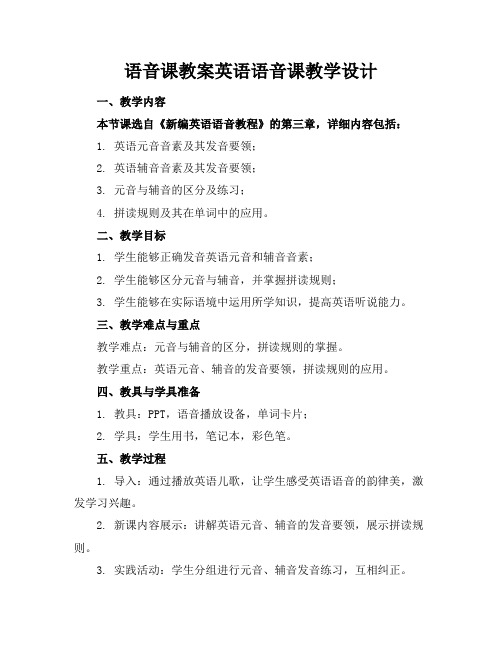
语音课教案英语语音课教学设计一、教学内容本节课选自《新编英语语音教程》的第三章,详细内容包括:1. 英语元音音素及其发音要领;2. 英语辅音音素及其发音要领;3. 元音与辅音的区分及练习;4. 拼读规则及其在单词中的应用。
二、教学目标1. 学生能够正确发音英语元音和辅音音素;2. 学生能够区分元音与辅音,并掌握拼读规则;3. 学生能够在实际语境中运用所学知识,提高英语听说能力。
三、教学难点与重点教学难点:元音与辅音的区分,拼读规则的掌握。
教学重点:英语元音、辅音的发音要领,拼读规则的应用。
四、教具与学具准备1. 教具:PPT,语音播放设备,单词卡片;2. 学具:学生用书,笔记本,彩色笔。
五、教学过程1. 导入:通过播放英语儿歌,让学生感受英语语音的韵律美,激发学习兴趣。
2. 新课内容展示:讲解英语元音、辅音的发音要领,展示拼读规则。
3. 实践活动:学生分组进行元音、辅音发音练习,互相纠正。
4. 例题讲解:分析单词拼写与发音的关系,引导学生运用拼读规则。
5. 随堂练习:让学生朗读单词,巩固所学知识。
6. 小组讨论:讨论拼读规则在实际应用中的注意事项。
六、板书设计1. 英语元音、辅音音素表;2. 拼读规则;3. 课堂练习单词。
七、作业设计1. 作业题目:(1)朗读课文,录音自评;(2)根据拼读规则,拼写给定单词;(3)用所学语音知识,编写一段对话。
2. 答案:(1)见课文;(2)见课后单词表;(3)略。
八、课后反思及拓展延伸1. 反思:关注学生在课堂上的发音问题,及时进行个性化指导。
2. 拓展延伸:鼓励学生在课后观看英语原声电影,模仿地道发音,提高听说能力。
同时,推荐相关语音学习资料,帮助学生巩固所学知识。
重点和难点解析1. 教学难点:元音与辅音的区分,拼读规则的掌握。
2. 实践活动:学生分组进行元音、辅音发音练习,互相纠正。
3. 例题讲解:分析单词拼写与发音的关系,引导学生运用拼读规则。
4. 作业设计:根据拼读规则,拼写给定单词。
英语语音教程教案
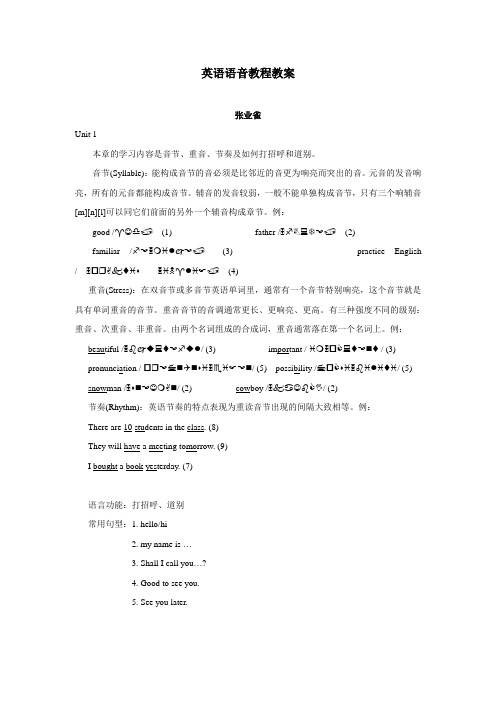
英语语音教程教案张业雀Unit 1本章的学习内容是音节、重音、节奏及如何打招呼和道别。
音节(Syllable):能构成音节的音必须是比邻近的音更为响亮而突出的音。
元音的发音响亮,所有的元音都能构成音节。
辅音的发音较弱,一般不能单独构成音节,只有三个响辅音[m][n][l]可以同它们前面的另外一个辅音构成章节。
例:good /♈☺♎ (1)father / ♐❆☜ (2)familiar /♐☜❍♓●☜ (3) practice English / ☐❒✌♦♓♦ ♓☠♈●♓☞ (4)重音(Stress):在双音节或多音节英语单词里,通常有一个音节特别响亮,这个音节就是具有单词重音的音节。
重音音节的音调通常更长、更响亮、更高。
有三种强度不同的级别:重音、次重音、非重音。
由两个名词组成的合成词,重音通常落在第一个名词上。
例:beautiful / ♌◆♦☜♐◆●/ (3) important / ♓❍☐♦☜⏹♦ / (3)pronunciation / ☐❒☜⏹✈⏹♦♓♏♓☞☜⏹/ (5) possibility / ☐♦♓♌♓●♓♦♓/ (5) snowman / ♦⏹☜☺❍✌⏹/ (2) cowboy / ♋☺♌✋/ (2)节奏(Rhythm):英语节奏的特点表现为重读音节出现的间隔大致相等。
例:There are 10 students in the class. (8)They will have a meeting tomorrow. (9)I bought a book yesterday. (7)语言功能:打招呼、道别常用句型:1. hello/hi2. my name is …3. Shall I call you…?4. Good to see you.5. See you later.Unit 2本章的学习内容是英语的塞音 ☐ ♌ ♦ ♎ ♑,如何介绍自己、互相介绍。
英语语音教案
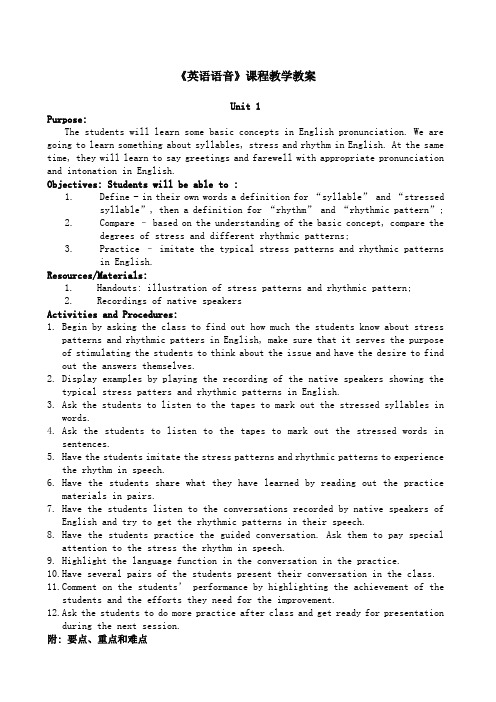
《英语语音》课程教学教案Unit 1Purpose:The students will learn some basic concepts in English pronunciation. We are going to learn something about syllables, stress and rhythm in English. At the same time, they will learn to say greetings and farewell with appropriate pronunciation and intonation in English.Objectives: Students will be able to :1.Define - in their own words a definition for “syllable”and “stressedsyllable”, then a definition for “rhythm” and “rhythmic pattern”;pare – based on the understanding of the basic concept, compare thedegrees of stress and different rhythmic patterns;3.Practice – imitate the typical stress patterns and rhythmic patternsin English.Resources/Materials:1.Handouts: illustration of stress patterns and rhythmic pattern;2.Recordings of native speakersActivities and Procedures:1.Begin by asking the class to find out how much the students know about stresspatterns and rhythmic patters in English, make sure that it serves the purpose of stimulating the students to think about the issue and have the desire to find out the answers themselves.2.Display examples by playing the recording of the native speakers showing thetypical stress patters and rhythmic patterns in English.3.Ask the students to listen to the tapes to mark out the stressed syllables inwords.4.Ask the students to listen to the tapes to mark out the stressed words insentences.5.Have the students imitate the stress patterns and rhythmic patterns to experiencethe rhythm in speech.6.Have the students share what they have learned by reading out the practicematerials in pairs.7.Have the students listen to the conversations recorded by native speakers ofEnglish and try to get the rhythmic patterns in their speech.8.Have the students practice the guided conversation. Ask them to pay specialattention to the stress the rhythm in speech.9.Highlight the language function in the conversation in the practice.10.Have several pairs of the students present their conversation in the class.ment on the students’ performance by highlighting the achievement of thestudents and the efforts they need for the improvement.12.Ask the students to do more practice after class and get ready for presentationduring the next session.附: 要点、重点和难点Unit 1Basic Concepts: Syllables, Stress & RhythmIn this unit, we are going to learn some basic concepts in English pronunciation. We are going to learn something about syllables, stress and rhythm in English. At the same time, we are going to learn to say greetings and farewell with appropriate pronunciation and intonation in English.First of all, let’s look at the syllable in English.Please listen to the following word: driveway.Now, tell me, how many syllables there are in this word? Right. There are two. Please listen to the following sentence: Drive him away.Tell me, how many syllables there are in this sentence? Right. There are four. IntroductionSo. What is a syllable?A syllable is a word part and the basic unit of English rhythm. English words can have one, two, three or even more syllables. In the word ‘driveway’, there are two syllables. In the sentence ‘Drive him away’, there are four.What is a stressed syllable?In English words with more than one syllable, one of them will receive more stress than the others. Stressed syllables are those that are marked in the dictionary as stressed. For example, in the word ‘driveway’, the first syllable is a stressed syllable while the second syllable is not.Stressed syllables in English are usually longer, louder, and higher in pitch.Listen to the following example:ba NAAAA naSyllable 1 Syllable 2 Syllable 3(short) (long) (short)The word "banana" has 3 syllables. Syllable 1 is not stressed and so is short.Syllable 2 is stressed and so is long with a clear vowel sound /:/. Syllable 3is not stressed and so is also short.Here is a short summary about the stressed and unstressed syllables:Stressed syllables are strong syllables. Unstressed syllables are weak syllables.Stressed syllables:-are long-have a pitch change-have full vowel sounds.Unstressed syllables:-are short-often have a reduced vowel sound.Now let’s look at the rhythm in English.We all know that correct pronunciation of the individual English sounds is important in communication. The way the sounds are organized, however, is often more crucial for understanding. The rhythm of English, for example, is one of the two major organizing structures that native speakers rely on to process speech.What is rhythm?Rhythm can be found everywhere in life: the sound of a clock, the beating of the heart, the strokes of a swimmer, and of course in poetry and music. But rhythm in language is less familiar because it is less obvious. The rhythm of a language is characterized by the timing pattern of successive syllables. In some languages, every syllable is given about the same length, while in others, syllables vary in length. In English, strong beats are called stress -- the heart of the rhythmic pattern.第1单元基本概念:音节、重音与节奏本单元将向大家介绍英语语音语调的基本概念, 主要介绍英语语音的音节、重音和节奏规律。
【外语学习】实用英语语音学 电子教案c7
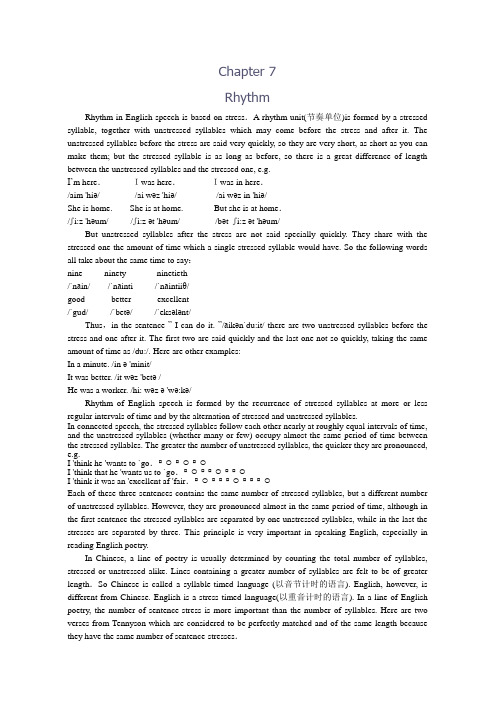
Chapter 7RhythmRhythm in English speech is based on stress.A rhythm unit(节奏单位)is formed by a stressed syllable, together with unstressed syllables which may come before the stress and after it. The unstressed syllables before the stress are said very quickly, so they are very short, as short as you can make them; but the stressed syllable is as long as before, so there is a great difference of length between the unstressed syllables and the stressed one, e.g.I’m here.Iwas here.Iwas in here./aim 'hiә/ /ai wәz 'hiә/ /ai wәz in 'hiә/She is home. She is at home. But she is at home./ʃi:z 'hәum/ /ʃi:z әt 'hәum/ /bәt ʃi:z әt 'hәum/But unstressed syllables after the stress are not said specially quickly. They share with the stressed one the amount of time which a single stressed syllable would have. So the following words all take about the same time to say:nine ninety ninetieth/`nаin/ /`nаinti /`nаintiiθ/good better excellent/`gud/ /`betә/ /`eksәlәnt/Thus,in the sentence ” I can do it. ”/аikәn`du:it/ there are two unstressed syllables before the stress and one after it. The first two are said quickly and the last one not so quickly, taking the same amount of time as /du:/. Here are other examples:In a minute. /in ә 'minit/It was better. /it wәz 'betә /He was a worker. /hi: wәz ә 'wә:kә/Rhythm of English speech is formed by the recurrence of stressed syllables at more or less regular intervals of time and by the alternation of stressed and unstressed syllables.In connected speech, the stressed syllables follow each other nearly at roughly equal intervals of time, and the unstressed syllables (whether many or few) occupy almost the same period of time between the stressed syllables. The greater the number of unstressed syllables, the quicker they are pronounced, e.g.I 'think he 'wants to `go.▫○▫○▫○I 'think that he 'wants us to `go.▫○▫▫○▫▫○I 'think it was an 'excellent af 'fair.▫○▫▫▫○▫▫▫○Each of these three sentences contains the same number of stressed syllables, but a different number of unstressed syllables. However, they are pronounced almost in the same period of time, although in the first sentence the stressed syllables are separated by one unstressed syllables, while in the last the stresses are separated by three. This principle is very important in speaking English, especially in reading English poetry.In Chinese, a line of poetry is usually determined by counting the total number of syllables, stressed or unstressed alike. Lines containing a greater number of syllables are felt to be of greater length.So Chinese is called a syllable-timed language (以音节计时的语言). English, however, is different from Chinese. English is a stress-timed language(以重音计时的语言). In a line of English poetry, the number of sentence-stress is more important than the number of syllables. Here are two verses from Tennyson which are considered to be perfectly matched and of the same length because they have the same number of sentence-stresses.“'Break, 'break, 'break,On thy 'cold gray 'stones,O 'Sea!”The unstressed syllables are so unimportant, rhythmically speaking, that it is not even necessary to count them. When a person recites those lines, it takes him as long to say the first as the second, even though the first contains only three syllables and the second is made up of seven. The following are lines of a poem for practice:'Give a 'man a 'pipe he can 'smoke,'Give a 'man a 'book he can 'read;And his 'home is 'bright with a 'calm de 'light,Though the 'room is 'poor in'deed.Influence of rhythm upon word-stressIn addition to the regular recurrence of stressed syllables, the rhythm of English speech has another characteristic feature, i.e., the alternation of stressed and unstressed syllables. There is a strong tendency in connected English speech to avoid stressing two syllables in succession. Under the influence of this peculiarity of English rhythm, words normally pronounced with two equally strong stresses in isolation may lose the first when closely preceded by another stressed syllable, or they may lose the second when closely followed by another stressed syllable.Examples:Chinese /'ʧai'ni:z/They are having a Chinese lesson./ðei ә 'hæviŋә 'ʧai'ni:z 'lesn/They speak Chinese./ ðei 'spi:k ʧai'ni:z /Upstairs /'Λp'stεә z/He lives in an upstairs room./hi: 'livz in әn 'Λp s tεә z 'ru:m/He went upstairs./hi: wentΛp'stεә z /Second-hand /'sekәnd'hænd/It is a second-hand bookshop./its ә 'sekәndhænd 'bukʃɔp/It was bought second-hand./its wәz 'bɔ:t sekәnd'hænd/The influence of rhythm on sentence-stressUnder the influence of the same tendency of English rhythm to the alternation of stressed and unstressed syllables, words with full lexical meaning may lose their stress in a sense group.Examples:He left London. /hi: 'left 'lΛndәn/Tom left London. /'tɔm left 'lΛndәn/Very good! /'veri 'gud/Not very good! /'nɔt veri 'gud/How many? /'hau 'meni/How many pens do you have? /'hau meni 'penz dә ju: 'hæv/He put on his hat. /hi: 'put ɔn iz 'hæt /He put his hat on. /hi: 'put iz'hæt ɔn /He put it on. /hi: 'put it 'ɔn /Take off the map. /'teik ɔf ðә 'mæp/Take the map off. /'teik ðә'mæpɔf /Take it off. /'teik it'ɔf /Thus the characteristic features of English speech rhythm may be summed up as follows:1) The regular recurrence of stressed syllables,which results in:(a) the pronunciation of each rhythmic group in a sense-group in the same period of time, irrespective of the number of unstressed syllables in it;(b) the influence of this feature of English speech rhythm upon the tempo of speech (语速) and thelength of sounds, especially vowels.2) The alternation of stressed and unstressed syllables, which results in the influence of rhythm upon word-stress and sentence-stress.One way to improve your rhythm is to beat the rhythm with your hand, one beat for each stressed syllable and with exactly the same time between each pair of beats. Now try the following groups of words.The “key” written at the beginning of each group tells you which part to emphasize. The sign “O”shows a stressed syllable,and the sign “.” shows an un stressed syllable.▫○▫I’ve 'read it.I 'told him.○▫○'Try a'gain.'Have a 'drink.○▫▫○'Where have you 'been? 'What have you 'done?▫○▫○▫It is 'time.He has 'come.▫○▫○▫It’s 'time for 'dinner. They’ll 'go to'morrow. 'Time for 'dinner.○▫○▫'Peter 'answered.。
《英语语音》课程教学教案

《英语语音》课程教学教案一、教学内容本节课我们将学习《英语语音》教材的第三章“元音音素及其发音”,详细内容涉及长元音、短元音、双元音的发音规则及其在单词中的应用。
二、教学目标1. 学生能够掌握元音音素的发音要领,准确发音。
2. 学生能够辨别并运用元音音素在单词中的使用。
3. 学生通过语音练习,提高英语听说能力,增强语言感知。
三、教学难点与重点难点:元音音素的发音准确性,尤其是相似音素的区分。
重点:元音音素的发音规则以及在单词中的应用。
四、教具与学具准备1. 教师准备:PPT、录音机、教材、卡片。
2. 学生准备:教材、笔记本、彩色笔。
五、教学过程1. 实践情景引入(5分钟)教师播放一段英语动画片,让学生注意其中的元音音素发音。
2. 例题讲解(15分钟)教师通过PPT展示元音音素的发音口型、舌位等要点,并进行示范。
教师选取教材中的例词,引导学生跟读、模仿,纠正发音。
3. 随堂练习(10分钟)学生分组进行元音音素发音练习,相互纠正,共同进步。
教师挑选学生代表进行发音展示,给予评价与鼓励。
4. 应用实践(10分钟)教师设计一个简单的对话,让学生分角色进行朗读,注意元音音素的发音。
学生进行角色扮演,教师评价并指导。
学生分享学习心得,提出疑问,教师解答。
六、板书设计1. 《英语语音》第三章元音音素及其发音2. 内容:元音音素分类:长元音、短元音、双元音发音要领:口型、舌位、声带振动例词:[展示教材中的例词,标注元音音素]七、作业设计1. 作业题目:请运用本节课所学的元音音素,编写一段对话,不少于五行。
2. 答案示例:A: Hi, Tom! How was your vacation?B: It was great, thanks! I visited my grandma in the countryside.A: That's wonderful! Did you enjoy the fresh air?B: Yes, I did. I also helped her with farming.A: Sounds interesting! I hope to visit there someday.八、课后反思及拓展延伸1. 教师反思:关注学生的学习反馈,调整教学方法,提高元音音素教学的针对性和实效性。
语音课教案英语语音课教学设计
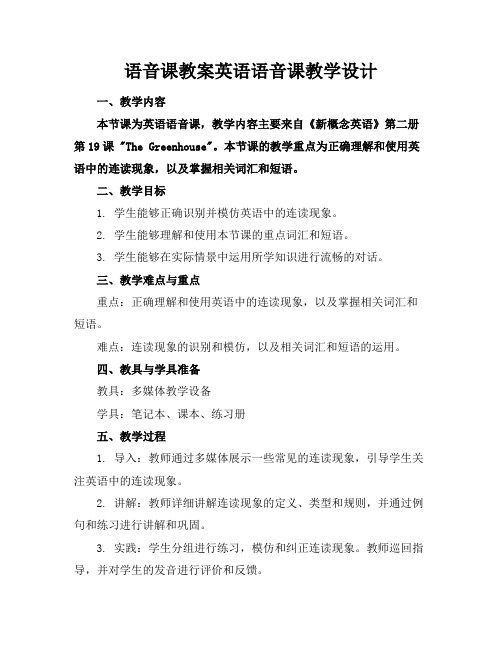
语音课教案英语语音课教学设计一、教学内容本节课为英语语音课,教学内容主要来自《新概念英语》第二册第19课 "The Greenhouse"。
本节课的教学重点为正确理解和使用英语中的连读现象,以及掌握相关词汇和短语。
二、教学目标1. 学生能够正确识别并模仿英语中的连读现象。
2. 学生能够理解和使用本节课的重点词汇和短语。
3. 学生能够在实际情景中运用所学知识进行流畅的对话。
三、教学难点与重点重点:正确理解和使用英语中的连读现象,以及掌握相关词汇和短语。
难点:连读现象的识别和模仿,以及相关词汇和短语的运用。
四、教具与学具准备教具:多媒体教学设备学具:笔记本、课本、练习册五、教学过程1. 导入:教师通过多媒体展示一些常见的连读现象,引导学生关注英语中的连读现象。
2. 讲解:教师详细讲解连读现象的定义、类型和规则,并通过例句和练习进行讲解和巩固。
3. 实践:学生分组进行练习,模仿和纠正连读现象。
教师巡回指导,并对学生的发音进行评价和反馈。
4. 应用:学生分成小组,根据所学的连读现象,编写一段对话。
教师对学生的对话进行评价和反馈。
六、板书设计板书内容:连读现象的定义、类型和规则。
七、作业设计1. 作业题目:请根据所学的连读现象,编写一段对话,并尽量使用本节课的重点词汇和短语。
A: Hey, B, how was your day?B: Oh, it was okay. I had a meeting this morning, and then I worked on the project.A: That sounds busy. Did you make any progress?B: Yes, I did. I finished the report and sent it to the boss.A: Great! I hope you get some good feedback.B: Me too. Anyway, how was your day?A: Yes, I did. I got an invitation to a conference next month.B: That's cool! I hope you have a great time.A: Thanks, B. I'm looking forward to it.1. I had a meeting this morning.2. I worked on the project.3. I finished the report and sent it to the boss.4. I hope you get some good feedback.5. I went for a run in the morning.7. I got an invitation to a conference next month.8. I hope you have a great time.9. I'm looking forward to it.八、课后反思及拓展延伸本节课通过讲解和练习,让学生了解了英语中的连读现象,并能够正确识别和模仿。
英语语音教案
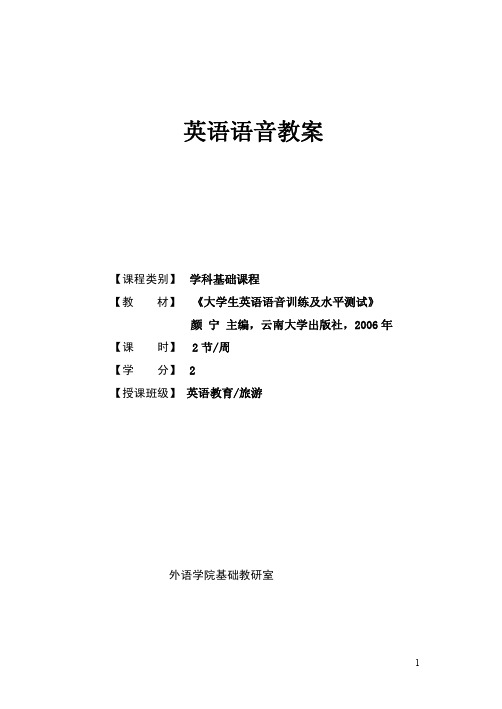
英语语音教案【课程类别】学科基础课程【教 材】 《大学生英语语音训练及水平测试》颜 宁 主编,云南大学出版社,2006年 【课 时】 2节/周【学 分】 2【授课班级】 英语教育/旅游外语学院基础教研室【课程性质、目标和要求】(课程性质)本课程为知识和技能相结合的英语专业学科基础课程。
(教学目标)通过向学生系统介绍英语语音和语调的知识,使学生通过学习和练习掌握英语的发音、语流的规律、语调的功能,基本上能正确使用英语语音、语调朗读、表达思想并进行交际。
(教学要求)以学生练习为主,从听辨音、调能力的培养入手,将听力、发音与口头表达三方面的训练紧密结合起来,即强调基本功的训练,又注意活用练习。
教学内容要求突出以下几个方面:①英语音素的正确发音方法、辨音能力、模仿能力综合训练;②英语的单词重音及语句重音的基本规律、表现形式、表意功能的讲解与训练;③英语语流的节奏规律、基本特征、基本要素、强/弱读式的训练;④英语所特有的语音、语调的结构、功能及其在交际中的运用;⑤选用适当的语音材料,让学生进行多层次的模仿训练。
【教学时间安排】本课程计 2学分,32 课时, 课时分配如下:章次 课程内容 课时 备注(教学形式)1第一章 音位第一节 英语语音学基本理论一、语音学(0.5)二、音位和音位变体(0.5)三、国际音标(0.5)四、英国标准音(0.5)2本单元以教师的讲解为主,让学生对将要学习课程的内容(理论与实践)、理论基础及学习本课程的意义有初步的了解。
1 第二节元音一、发音器官(1)二、单元音(3)(一)前元音(二)后元音(三)中元音三、双元音(2)(一)合口双元音(二)集中双元音6本单元以《大学生英语语音训练及水平测试》课堂教学及训练为主,配合New Concept English (Book Two)模仿练习。
1 第三节辅音一、爆破音(1.5)二、摩擦音(2)三、破擦音(0.5)四、鼻音(0.5)五、舌侧音(0.5)六、无摩擦延续音(0.5)七、半元音(0.5)6本单元以《大学生英语语音训练及水平测试》课堂教学及训练为主,配合New Concept English (Book Two)模仿练习。
实用英语电子教案3(第四版) (3)[3页]
![实用英语电子教案3(第四版) (3)[3页]](https://img.taocdn.com/s3/m/d0acfa41b8f67c1cfad6b8f4.png)
The Global Positioning System (GPS) is a U.S. space-based global navigation satellite system. It provides reliable positioning, navigation, and timing services to worldwide users on a continuous basis in all weather, day and night, anywhere on or near the Earth which has an unobstructed view of four or more GPS satellites.GPS is made up of three segments: Space, Control and User. The Space Segment is composed of 24 to 32 satellites in Medium Earth Orbit and also includes the boosters required to launch them into orbit. The Control Segment is composed of a Master Control Station, an Alternate Master Control Station, and a host of dedicated and shared Ground Antennas and Monitor Stations. The User Segment is composed of hundreds of thousands of U.S. and allied military users of the secure GPS Precise Positioning Service, and tens of millions of civil, commercial and scientific users of the Standard Positioning Service (see GPS navigation devices). GPS satellites broadcast signals from space that GPS receivers use to provide three-dimensional location (latitude, longitude, and altitude) plus precise time.GPS has become a widely used aid to navigation worldwide, and a useful tool for map-making, land surveying, commerce, scientific uses, tracking and surveillance, and hobbies such as geocaching and waymarking. Also, the precise time reference is used in many applications including the scientific study of earthquakes and as a time synchronization source for cellular network protocols.GPS has become a mainstay of transportation systems worldwide, providing navigation for aviation, ground, and maritime operations. Disaster relief and emergency services depend upon GPS for location and timing capabilities in theirlife-saving missions. The accurate timing that GPS provides facilitates everyday activities such as banking, mobile phone operations, and even the control of power grids. Farmers, surveyors, geologists and countless others perform their work more efficiently, safely, economically, and accurately using the free and open GPS signals.Le Monde (English: The World) is a French daily evening newspaper with a circulation as of 2004 of 371,803. It is considered the French newspaper of record, and is generally well respected, often the only French newspaper easily obtainable in non-Francophone countries.The newspaper should not be confused with the monthly publication Le Monde diplomatique, of which Le Monde has 51% ownership, but which is editorially independent.Le Monde—founded by Hubert Beuve-Méry at the request of General Charles de Gaulle after the German army was driven from Paris during World War II—took over the format of Le Temps, whose reputation had suffered during the Occupation.[2] Beuve-Méry reportedly demanded total editorial independence as the condition for his taking on the project. Its first edition appeared on December 19, 1944. Le Monde hasbeen available on the Internet since December 19, 1995. It is the principal publication of Groupe La Vie-Le Monde.Its current board chairman and director of publication is Éric Fottorino and the current chief editor(rédacteur en chef) is Sylvie Kauffmann. Plantu is one of several political cartoonists who contribute to the paper, and his work is often featured on the front page above the fold./wiki/Le_MondeThe iPod is a portable media player designed and marketed by Apple and launched on October 23, 2001. The product line-up includes the hard drive-based iPod Classic, the touchscreen iPod Touch, the video-capable iPod Nano, and the compact iPod Shuffle. The iPhone can function as an iPod but is generally treated as a separate product. Former iPod models include the iPod Mini and the spin-off iPod Photo (since reintegrated into the main iPod Classic line). iPod Classic models store media on an internal hard drive, while all other models use flash memory to enable their smaller size (the discontinued Mini used a Microdrive miniature hard drive). As with many other digital music players, iPods can also serve as external data storage devices. Storage capacity varies by model, ranging from 2GB for the iPod Shuffle to 160GB for the iPod Classic.Apple's iTunes software can be used to transfer music to the devices from computers using certain versions of Apple Macintosh and Microsoft Windows operating systems.[1] For users who choose not to use Apple's software or whose computers cannot run iTunes software, several open source alternatives to iTunes are also available.[2] iTunes and its alternatives may also transfer photos, videos, games, contact information, e-mail settings, Web bookmarks, and calendars to iPod models supporting those features. The Apple iPod is the only device compatible with iTunes, although select devices from Archos are compatible./wiki/IpodThe Internet is a global system of interconnected computer networks that use the standard Internet Protocol Suite (TCP/IP) to serve billions of users worldwide. It is a network of networks that consists of millions of private and public, academic, business, and government networks of local to global scope that are linked by a broad array of electronic and optical networking technologies. The Internet carries a vast array of information resources and services, most notably the inter-linked hypertext documents of the World Wide Web (WWW) and the infrastructure to support electronic mail. Most traditional communications media, such as telephone and television services, are reshaped or redefined using the technologies of the Internet, giving rise to servicessuch as Voice over Internet Protocol (VoIP) and IPTV. Newspaper publishing has been reshaped into Web sites, blogging, and web feeds. The Internet has enabled or accelerated the creation of new forms of human interactions through instant messaging, Internet forums, and social networking sites.The origins of the Internet reach back to the 1960s when the United States funded research projects of its military agencies to build robust, fault-tolerant and distributed computer networks. This research and a period of civilian funding of a new U.S. backbone by the National Science Foundation spawned worldwide participation in the development of new networking technologies and led to the commercialization of an international network in the mid 1990s, and resulted in the following popularization of countless applications in virtually every aspect of modern human life. As of 2009, an estimated quarter of Earth's population uses the services of the Internet.The Internet has no centralized governance in either technological implementation or policies for access and usage; each constituent network sets its own standards. Only the overreaching definitions of the two principal name spaces in the Internet, the Internet Protocol address space and the Domain Name System, are directed by a maintainer organization, the Internet Corporation for Assigned Names and Numbers (ICANN). The technical underpinning and standardization of the core protocols (IPv4 and IPv6) is an activity of the Internet Engineering Task Force (IETF), a non-profit organization of loosely-affiliated international participants that anyone may associate with by contributing technical expertise./wiki/Internet。
英语语音教程教案
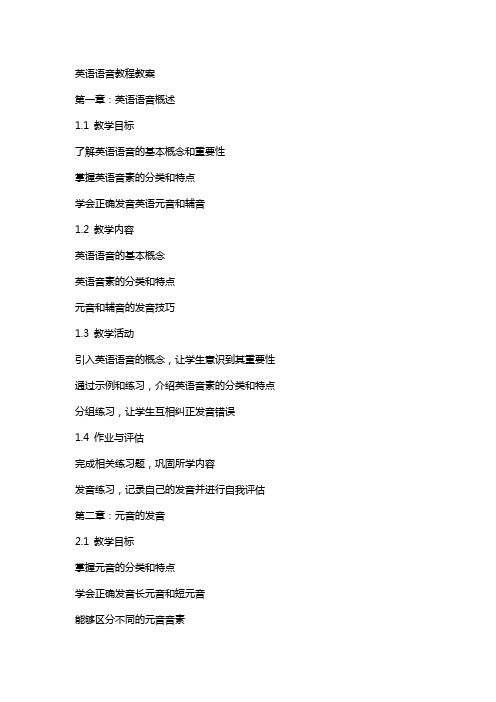
英语语音教程教案第一章:英语语音概述1.1 教学目标了解英语语音的基本概念和重要性掌握英语音素的分类和特点学会正确发音英语元音和辅音1.2 教学内容英语语音的基本概念英语音素的分类和特点元音和辅音的发音技巧1.3 教学活动引入英语语音的概念,让学生意识到其重要性通过示例和练习,介绍英语音素的分类和特点分组练习,让学生互相纠正发音错误1.4 作业与评估完成相关练习题,巩固所学内容发音练习,记录自己的发音并进行自我评估第二章:元音的发音2.1 教学目标掌握元音的分类和特点学会正确发音长元音和短元音能够区分不同的元音音素2.2 教学内容元音的分类和特点长元音和短元音的发音技巧元音的区分练习2.3 教学活动通过示例和练习,介绍元音的分类和特点发音练习,让学生正确发音长元音和短元音听力练习,区分不同的元音音素2.4 作业与评估完成相关练习题,巩固所学内容发音练习,记录自己的发音并进行自我评估第三章:辅音的发音3.1 教学目标掌握辅音的分类和特点学会正确发音清辅音和浊辅音能够区分不同的辅音音素3.2 教学内容辅音的分类和特点清辅音和浊辅音的发音技巧辅音的区分练习3.3 教学活动通过示例和练习,介绍辅音的分类和特点发音练习,让学生正确发音清辅音和浊辅音听力练习,区分不同的辅音音素3.4 作业与评估完成相关练习题,巩固所学内容发音练习,记录自己的发音并进行自我评估第四章:音标的使用4.1 教学目标学会使用国际音标标注单词发音能够根据音标正确发音单词理解音标在学习和交流中的重要性4.2 教学内容国际音标的符号和发音规则音标的标注方法和技巧音标的使用练习4.3 教学活动介绍国际音标的符号和发音规则练习音标的标注方法和技巧学生互相练习,纠正发音错误4.4 作业与评估完成相关练习题,巩固所学内容标注单词发音,并进行自我评估第五章:语音的连读和节奏5.1 教学目标了解语音连读和节奏的概念和重要性学会正确发音连读和节奏能够运用连读和节奏提高英语口语表达能力5.2 教学内容语音连读和节奏的概念和特点连读和节奏的发音技巧连读和节奏的练习5.3 教学活动引入语音连读和节奏的概念,让学生意识到其重要性通过示例和练习,介绍连读和节奏的发音技巧角色扮演和口语练习,运用连读和节奏进行对话5.4 作业与评估完成相关练习题,巩固所学内容口语练习,录制自己的语音并进行自我评估第六章:语音的弱读和强调6.1 教学目标了解语音弱读和强调的概念和重要性学会正确发音弱读和强调能够运用弱读和强调提高英语口语表达能力6.2 教学内容语音弱读和强调的概念和特点弱读和强调的发音技巧弱读和强调的练习6.3 教学活动引入语音弱读和强调的概念,让学生意识到其重要性通过示例和练习,介绍弱读和强调的发音技巧角色扮演和口语练习,运用弱读和强调进行对话6.4 作业与评估完成相关练习题,巩固所学内容口语练习,录制自己的语音并进行自我评估第七章:语音的缩读和同化7.1 教学目标了解语音缩读和同化的概念和重要性学会正确发音缩读和同化能够运用缩读和同化提高英语口语表达能力7.2 教学内容语音缩读和同化的概念和特点缩读和同化的发音技巧缩读和同化的练习7.3 教学活动引入语音缩读和同化的概念,让学生意识到其重要性通过示例和练习,介绍缩读和同化的发音技巧角色扮演和口语练习,运用缩读和同化进行对话7.4 作业与评估完成相关练习题,巩固所学内容口语练习,录制自己的语音并进行自我评估第八章:英语语音的差异与辨析8.1 教学目标了解英语语音的差异和重要性学会正确发音英语中常见的易混淆音素能够运用语音辨析提高英语听力和口语能力8.2 教学内容英语语音的差异和特点易混淆音素的发音技巧语音辨析的练习8.3 教学活动引入英语语音的差异和特点,让学生意识到其重要性通过示例和练习,介绍易混淆音素的发音技巧听力练习和口语练习,提高语音辨析能力8.4 作业与评估完成相关练习题,巩固所学内容听力练习,记录自己的听力和口语并进行自我评估第九章:语音的应用于实际情境9.1 教学目标学会在实际情境中运用所学的语音知识能够正确发音英语句子和对话提高英语口语表达能力和交流能力9.2 教学内容实际情境中语音的应用英语句子和对话的发音技巧口语练习和角色扮演9.3 教学活动引入实际情境中语音的应用,让学生意识到其重要性通过示例和练习,介绍英语句子和对话的发音技巧角色扮演和口语练习,运用语音知识进行交流9.4 作业与评估完成相关练习题,巩固所学内容口语练习,录制自己的语音并进行自我评估第十章:语音的进一步实践与提高10.1 教学目标进一步提高英语语音水平学会运用语音知识进行高级口语表达和演讲提高英语听力和口语能力10.2 教学内容高级语音技巧和发音练习口语表达和演讲的技巧语音实践和展示10.3 教学活动引入高级语音技巧和发音练习,让学生进一步挑战自己通过示例和练习,介绍口语表达和演讲的技巧语音实践和展示,提高英语听力和口语能力10.4 作业与评估完成相关练习题,巩固所学内容口语练习和演讲展示,录制自己的语音并进行自我评估重点和难点解析一、英语语音概述:理解英语语音的基本概念和重要性,掌握英语音素的分类和特点,学会正确发音英语元音和辅音。
外研社2024教学课件-实用英语语音教程-3 元音

实用英语语音教程
知行合一
1. 单词中的元音 根据发音要领朗读单词,对比教材录音反复练习。 e. 元音的音长及发音随语音环境的变化而变化 Clean vs. Creek 哪个/iː/ 音长?
➢ 鼻音之前的元音常常需要拖音。 ➢ lamb
实用英语语音教程
知行合一
2. 段落中的元音
实用英语语音教程
知行合一
2. 段落中的元音
实用英语语音教程
知行合一
2. 段落中的元音
实用英语语音教程
实用英语语音教程
A Practical Course in English Pronunciation
tour, sure, more, cure The poor man was assured that his child could be cured.
实用英语语音教程
知行合一
1 单词中的元音
2
段落中的元音
实用英语语音教程
知行合一
1. 单词中的元音 根据发音要领朗读单词,对比教材录音反复练习。 a. 长元音发音要够长 ➢ please, clean, seed, sir, food, afford b. 圆唇音须圆唇 ➢ on, gone c. 展唇音须展唇,嘴角两边向外拉伸 ➢ bird, learn, world
/ˈfaɪə/(/aɪ/+/ə/)
or
/faə/
实用英语语音教程
知语识音
fire:三元音
英语三元音
实用英语语音教程
知语识音
元音小贴士
➢ 与辅音相比,元音的发音不够精确,在一定区间内的不同变体均可接受。 同时,元音也经历着历时的语音变化,各种变体共存。中国学习者应当 “严以律己,宽以待人”:从“说话者”角度,应尽量采用最典型的发 音,而从“听者”角度,则应提高自己对不同口音的理解能力。
英语语音课程教案
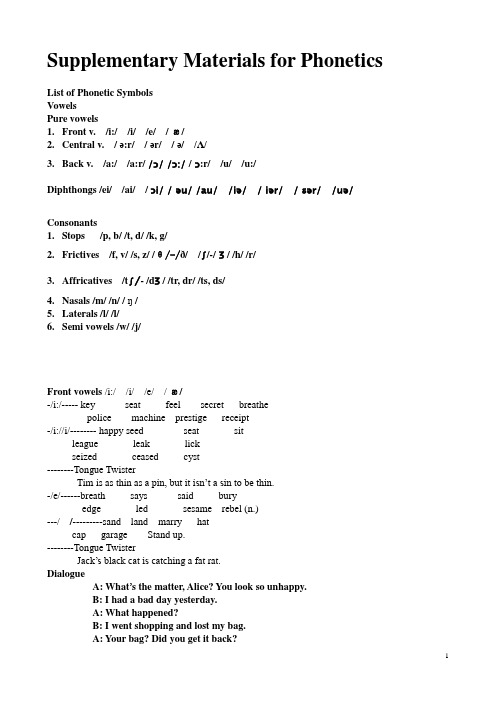
Supplementary Materials for Phonetics List of Phonetic SymbolsVowelsPure vowels1.Front v. /i:/ /i/ /e/ /æ /2.Central v. / ə:r/ / ər/ / ə/ /Λ/3.Back v. /a:/ /a:r/ /ɔ/ /ɔ:/ /ɔ:r/ /u/ /u:/Diphthongs /ei/ /ai/ / ɔi/ / əu/ /au/ /iə/ / iər/ / ɛər/ /uə/ Consonants1.Stops /p, b/ /t, d/ /k, g/2.Frictives /f, v/ /s, z/ /θ/-/ð/ /∫/-/Ʒ / /h/ /r/3.Affricatives /t∫/- /dƷ / /tr, dr/ /ts, ds/4.Nasals /m/ /n/ /ŋ /terals /l/ /l/6.Semi vowels /w/ /j/Front vowels /i:/ /i/ /e/ /æ /-/i:/----- key seat feel secret breathepolice machine prestige receipt-/i://i/-------- happy seed seat sitleague leak lickseized ceased cyst--------Tongue TwisterTim is as thin as a pin, but it isn’t a sin to be thin.-/e/------breath says said buryedge led sesame rebel (n.)---//---------sand land marry hatcap garage Stand up.--------Tongue TwisterJack’s black cat is catchi ng a fat rat.DialogueA: What’s the matter, Alice? You look so unhappy.B: I had a bad day yesterday.A: What happened?B: I went shopping and lost my bag.A: Your bag? Did you get it back?B: I went back for it. But it was already gone.A: That’s too bad. I’m sorry to hear it.Back vowels /a:/ /a:r/ /ɔ/ /ɔ:/ /ɔ:r/ /u/ /u:/-/a:/------calm palm Chicago moustache naïve-/a:r/------car cart card heart park hardlarge pardon hectare part-/æ /------When the letter “a ” appears in front of one ofthe following letters, it is pronounced as / æ /.-ss; -st; -sk; -th; -f; -lf; -m; -n; -gh/s/ /θ/ /f/ /m/ /n/glass-class-pass; fast-last-master-vast-past;ask-task-basket; path-bath; after-staff-draft;half-calf; command-demanddance-chance-advance-advantage-plant-aunt-branch-answer-can’t; laugh-draught--------Martin’s aunt is taking a sun-bath in the afternoon.The dance party in the farmyard lasted far into the night.After class, half of the students went out of the classroom.“You want to lose the chance?” the teacher asked.Time passes very fast.-/ɔ/-----cough because sausage Australiaknowledge sorry wander --- wonder- ------Lots and lots of clocks and watches are on sale in the shops.-/ɔ:/ -----all of us almost always also-/ɔ:r/------George had four daughters born in autumn.horse more door four morning-/u:/ /u/-----new duty Tuesday produce tomb-------- It’s Coo lAt noon I took a book,And sat by the pool near the school.I soon took off my shoe,And put my foot in the pool.Oh, how cool!A: George, what’re you gonna do tomorrow?B: John and I plan to play hockey in the morning.A: And in the afternoon?B: Well, after a long nap, we’ll go yachting with Monica.A: You’re sure to have a nice day tomorrow.B: What’re you gonna do?A: Lots of wok in the office and lots of chores at home. How I envy you, George.Central vowels / ə:r/ / ər/ / ə/ /Λ/-/ ə:r/--------desert-dessert-/ ər/----Saturday yesterday effort better-/ ə/ -----about again panda China sofaAustralia breakfast possible famous delicious campus-/Λ/------sun son country southern doubleblood does love courage cousintongue housewife muscle oven stomach--------I gave her some peals for her thirty-first birthday.Father and mother gathered the butter together.Martha doesn’t like to go to the cinema or the theatre. She prefers the concertHurry up! The sun has come up. Don’t touch the muddy duck.--------Tongue TwisterOnce upon a barren moorthere dwelt a bear, also a boar.The bear couldn’t bear the boar,the boar thought the bear a bore.At last, the bear could bear no morethat boar that bored him on the moor.And so one morn he bored the boar.That boar will bore the bear no more.Dialogue:A: Were you ever hurt in an accident?B: Yes, once. I hurt my head, and Igot a burn on my leg.A: Were you taken to the emergency room?B: Well, a person help me get there. Then the doctors and nurses were certainly concerned. So I survived.A: You were really lucky, weren’t you?Diphthongs/ei/ /ai/ / ɔi/ / əu/ /au/ /iə/ / iər/ / ɛər/ /uər/-/ei/-----halfpenny change steak ballet bouquet-/ai/ ------aisle isle height either neither minute diary-dairy- / ɔi/-----boy noise oil employ-/ əu/ go no-/au/-------down town brow frown bow house bowel doubt drough--------found----fond down----donpound----pond town----ton-/iə/-----idea theatre museum-/ iər/----hear here ear-/ɛər/ bear----beard----moustachepear----pearl----tear (n.)----tear (v.)----mayor-/uər/----touristPlosives/ Stops /p/- /b/ /t/- /d/ /k/ -/g/-/p/-----peak happy rapid-/b/-----spin Spain sport whisper respect--------captain top boy cheap cheese--------cap----cab mop----mob-----Tongue TwisterPeter Pepper picked up a peck of pickled peppers.Did Peter Pepper pick up a peck of pickled peppers?If Peter Pepper picked up a peck of pickled peppers,Where is the peck of pickled peppers Peter Pepper picked up.-/t/------too task tie-/d/-----steak stone start-football that day great joke Good morning!Water better butter Peter Betty fortyBetty bought a bit of better butter.But said she: “This butter is bitter.It’ll make my batter bitter.”Fricatives /f/ -/v/ /s/ -/z/ /θ/-/ð/ /∫/-/Ʒ / /r/ /h/--/f//v/------five view--------Forty fat farmers found a field of fine fresh fodder.Now, if the forty fat farmers found a field of fine fresh fodder,Where is the field of fine fresh fodder those forty fat farmers found. -/s//z/------seize-/θ//-ð /-----think thank thought these those--------Neither my mother nor my father likes this weather.-/∫/-/Ʒ /------she shell shore--------She sells seashells on the seashore,And the shells she sells are seashells, I’m sure.‘cause if she sells seashells on the seashore,The shells she sells are seashells for sure.-/r/-----spring scream for ever far away there is-----Robert Rolly rolled a round roll around.If Robert Rolly rolled a round roll around ,Where is the round roll Robert rolled around.Laterals /l/ /l/-/l/-------love glad only failure million sleep-/l/------feel girl help world almostNasals /m/ /n/ /ŋ /-/n/-------snow----slow now----loud----The next number is neither nine nor ninety-nine,but nine thousand nine hundred and ninety-nine.-/n/-/ŋ /-----sin----sing thin----thing son----song--singer singing sing a songThe Old Man is SnoringIt’s raining. It’s singing.The old man is snoring.He jumped into bed.And bumped his head,And couldn’t get up the next morning.Affricates /t∫/- /dƷ / /tr/-/dr/ /ts/-/ds/-/t∫/------China cheap choice choose chose chosen-/dƷ /------Our Joe wants to know if your Joewill lend our Joe your Joe’s banjo.If your Joe won’t lend our Joe your Joe’s banjo,Our Joe won’t lend your Joeour Joe’s banjo when our Joe has a banjo.Jack watched George eat a peach on the bridge near the church.-/tr/--/dr/-----track try entry poetry street---The tracker tracked and tricked and trapped the tricky trickster.半元音/w/ /hw/ /j/-/w/ what where why when-/j/ year/ear| ɔs’treil jə| | əpə’t ju:niti| | ‘t∫ɔpstiks || lΛg’zuəriəs || ‘hændsəm | | ə’kauntənt | | dƷi’ɔmitrikəl | | pres’ti:Ʒ| | kæfi’tiəriə||dis’trɔi /--------c.+ /n//t/ cotton written certainly/d/ pardon garden suddenly/s/ lesson listen person/z/ season prison/v/ seven eleven seventy/f/ oftenc+/l/little/ capital----schedule lieutenant clerk textile missile epoch leisure hurry ate advertisement anti- address record either neither tomato magazine researchStressWord Stresssometimes bamboo produce homelanddecide goldsmith rehearsal timetablewell-known cafeteria Arabic calligraphynecessity afternoon grandchild occasionalindividually everyday disagreeable geometricalappropriate rectangular abbreviation diameterreceipt longevity approximate mooncakeSentence Stress1. We made the same mistakes on the test2. ------ That’s my sweater.------Oh no, it isn’t. It’s my sweater.3. ------Would you like me to write the letter?------No. I want him to write it.4.------Is Colin happy in his job?------No. He is going to move.------What’s Colin going to do?------He’s going to move.------Did you say Colin had moved?------No. He’ going to move.5.------When is Peter’s birthday?------It’s on the twenty-first.------Is Peter’ birthday on the thirty-first?------No. It’s on the twenty-first.------Did you say Peter’s birthday was on the twenty-fourth?------No. It’s on the twenty-first.English Songs1. Silent Night, Holy NightSilent night, holy night,All is calm, all is bright.Round your virgin mother and child,Holy infant, so tender and mild,Sleeping heavenly peace.Sleeping heavenly peace.2. Auld Lang SyneShould all acquaintance be forgot,And never brought to mind?Should all acquaintance be forgot,And days of auld lang syne?For auld lang syne, my dear,For auld lang syne.We’ll take a cup of kindness yetFor auld lang syne.3. EdelweissEdelweiss, edelweiss.Every morning you greet me.Small and white, clean and bright,You look happy to meet me.Blossom of snow may you bloom and grow, Bloom and grow for ever.Edelweiss, edelweiss,Bless my homeland forever.4. Do-Re-MeLet’s start at the very beginning,A very good place to start.When you read you begin with A B C, When you sing you begin with Do Re Mi, Do Re Mi, Do Re Mi,The first three notes just happen to be.Do Re Mi, Do Re Mi,Do Re Mi Fa So La Ti,Doe, a deer, a female deer,Ray, a drop of golden sun,Me, a name I call myself,Far, a long, long way to run,Sew, a needle pulling thread,La, a note to follow “Sew”,Tea, a drink with jam and bread.That’ll bring us back to Do, Do, Do,Do Re Mi Fa So La Ti Do So Do.5. Jingle BellsDashing through the snow,In a one-horse open sleigh,Over the fields we go,Laughing all the way;Bells on bobtail ring,Making spirits bright,What fun it’s to ride and singA sleighing song tonight!Jingle bells, jingle bells,Jingle all the way!Oh! What fun it’s to ride in aOne-horse open sleigh!Jingle bells, Jingle bells,Jingle all the way!Oh! What fun it’s to ride in a one-horse open sleigh.6. Old Black JoeGone are the days when my heart was young and gay; Gone are my friends from the cotton fields away;Gone from the earth to a better land I know,I hear their gentle voices calling, “Old Black Joe”.I’m coming, I’m coming,For my head is bending low.I hear their gentle voices calling, “Old Black Joe”.7. Oh, No, JohnOn yonder hill there stands a creature,Who she i s I don’t know;I shall go and court her for her beauty,She must answer yes or no,Oh, no, John, no, John, no, John, no!My father was a Spanish captain,Went to sea a month ago;First he kissed me, then he left me,Bid me always answer “No”.Oh, no, John, no John, no, John, no!8. Five Hundred MilesIf you miss the train I’m on,You will know that I am gone.You can hear the whistle blows a hundred miles.A hundred miles, a hundred miles, a hundred miles, a ……You can hear the whistle blows a hundred miles.Lord, I’m one. Lord, I’m two.Lord, I’m three, Lord, I’m four.Lord, I’m five hundred miles away from home.Away from home, away from home,Away from home, away from home.Lord, I’m five hundred miles away from home.Not a shirt on my back.Not a penny to my name.Lord, I’m five hundred miles away from home. Away from home, away from homeAway from home, away from home.Lord, I’m five hundred miles away from home.8. Home on the RangeOh, give me a home where the buffalo roam, Where the deer and the antelope play,Where seldom is heard a discouraging word, And the skies are not cloudy all day.Home, home on the range,Where the deer and the antelope play,Where seldom is heard a discouraging word, And the skies are not cloudy all day.9. Long Long AgoTell me the tales that to me were so dear. Long long ago, long long ago.Sing me the songs I delighted to hear.Long long ago, long ago.Now you’ve come, my grief is gone.Let me forget how love has won.Let me believe that you love as you loved. Long long ago, long ago.Long long ago, long ago.10. My Bonnie is Over the OceanMy Bonnie is over the ocean.My Bonnie is over the sea.My Bonnie is over the ocean.Oh, bring back my Bonnie to me.Bring back, bring back.Oh, bring back my Bonnie to me, to me. Bring back, bring back.Oh, bring back my Bonnie to me.11. You are My SunshineThe other night, dear, as I lay sleeping.I dreamed I held you in my arms.When I awoke, dear, I was mistaken.And I hung my head and cried.You are my sunshine, my only sunshine.You make me happy when skies are gray. You’ll never know, dear, how much I love you.Please don’t take my sunshine away.You told me once, dear, you really loved me.And no one else could come between.But now you’ve left me and love another,Yes, you’ve shattered all my dreams12. Yesterday Once MoreWhen I was young I’d listen to the radio,waiting for my favorite songs.When they played I’d sing along,It made me smileThose were such happy time and not so long ago,How I wondered where they’d gone,But they’re back againJust like a long lost friend.All the songs I love so well.Every sha-la-la-la every wo wo still shine.Every shing-a-ling-a-lingThat they’re starting to sing so fine.When they get to the part,Where he’s breaking her heart,It can really make me cry,Just like before.It’s yesterday once more.13. She’ll be Come in Around the MountainShe’ll be come in around the mountain when she comes. She’ll be come in around the mountain when she comes. She’ll be come in around the mountain,----------------When she comes.Short PlaysFly SoupCharacters:Henry Smith (S); a waiter (W); customer 1,2,3(C1, C2, C3); the restaurant manager(M)Scene: a crowded New York restaurantS: Waiter! Waiter!W: Yes?S: There’s a fly in my soup.W: But that’s impossible.S: Look!W: Where?S: There. What’s that?W: What?S: That little black speck of wet wings. What’s that?W: Black paper. It’s black paper.S: It is not black paper. It’s a fly.C1: What’s wrong?C2: What’s the matter?C3: What is it?S: There’s a fly in my soup.W: He says there’s a fly in his soup.C1: Where is it?C2: Let me see.S: There!C3: Yes. That’s a fly.W: No, it isn’t.S: Yes, it is.W: No, it isn’t.M: What’s going on here?W: This man says there’s a fly in his soup.M: There’s a fly in his soup in my restaurant?That’s impossible.S: Here, what’s this? Is this a fly or not?M: Shea! Please, Mr. Shea! Waiter, bring us steak dinner.S: Well, maybe, bring us steak dinner and wine and pie and coffee.C1: Wha t’s that?C2: What?C1: This.C2, C3: What is it?C1: it’s a box of flies.M: Get out of my restaurant. Get out!Tongue Twister1.A big black bug bit a big black bear made the big black bear bleed blood.Good morning blackboard2.Peter Pepper picked up a peck of pickled peppers.Did Peter Pepper pick up a peck of pickled peppers?If Peter Pepper picked up a peck of pickled peppers,Where is the peck of pickled peppers Peter Pepper picked up.3.Forty fat farmers found a field of fine fresh fodder.Now, if the forty fat farmers found a field of fine fresh fodder,Where is the field of fine fresh fodder those forty fat farmers found.4.She sells seashells on the seashore.The shells she sells are seashells, I’m sure.‘cause if she sells seashells on the seashore,the shells she sells are seashells for sure.5.Robert Rolly rolled a round roll around.If Robert Rolly rolled a round roll around,Where is the round roll Robert rolled around.Exercises for rhythm1.One, Two, Three, Four, fiveOne two three four five,Once I caught a fish alive.Six seven eight nine ten,then I let it go again.Why did you let it go?‘cause it bit my finger so.Which finger did it bite?This little finger on the right.1.Swift the Moment Flies Away.Swift the moment flies away.First the hours and then the day.Next the week the month the year,Go away and disappear.2.In the Merry Month of MayIn the merry month of May,All the little birds are gay.They all hop, land, sing and say,The winter days are far away.Welcome, welcome the merry may.3.Four seasonsSpring is gay with flower and songSummer is hot and days are long.Autumn is rich with fruit and grain,Winter brings snow and the New Year again.4.The Snow ManWe built a snow man nice and whiteAnd decorated him very bright,With a big top hat and a carrot nose,And a scarf as red a full-bloomed rose.This snow man came alive one day.And we did laugh and dance and play.By our fireplace he knelt,And too soon, our snow man did melt.5.DreamsHold fast to dreamsFor if dreams dieLife is a broken-winged birdThat cannot fly.Hold fast to dreamsFor when dreams goLife is a barren fieldFrozen with snow.6.I breathed a song into the air,it fell to earth I knew not where.for who has sight so keen and strong,that it can follow the flight of songs.7.Two Little DragonsTwo little dragons lived in a wood.One was bad one was good.One went walking straight to school.One went fishing in Cranberry pool.One learned add-up and takeaway.One spent all his time in play.One helped mother when school was done,One chased little boys just for fun.If you were a dragon and lived in a wood,Would you be bad or would you be good?Topics for discussion1. Talk with you partner about your personal preference for weather.2. Ask you friend to help you with your English studies3. Buying shoes in a shoe shop, talking with the shop assistant.talk with your partner about what you think you’ll be doing in the winter vocation.4. Discuss with your partner what are the advantages and disadvantages of having a phone, give your own opinions.6.Make a dinner date with your friend on the phone.语音练习 jazz chants1. Sh! Sh! Baby's sleeping !Presentation notes: I usually introduce this chants by asking the students what they say when Someone is making too much noise.I write their answers on the blac kboard, including Sh, Hush Please be quite and shut up, explaining the reason we are asking for silence is that the baby's sleeping.I said,Sh! Sh! Baby's sleeping!I said , Sh! Sh! Baby's sleeping!What did you say?What did you say ?I said Sh! Sh! Baby's sleeping!I said, Sh! Sh! Baby's sleeping!What did you say?What did you say ?I said,Please be quite,Baby's sleeping!I said,Please be quite,Baby's sleeping!What did you say?What did you say?What did you say?I said , Shut up! Shut up! Baby's sleeping !I said, Shut up! Shut up !Baby's sleeping !WAAAAAAAAAAAAAAAAAAAAEasterEaster Sunday is a Christian festival commemorating the Resurrection of Christ. It is in spring, usually in April. The idea of the egg as a symbol of new life was adopted to symbolize the Resurrection. Easter is a joyful church holiday, and many churches have an outdoor service at sunrise on this day. Children and their parents color hard-boiled eggs before Easter. Late Saturday night or early Sunday morning the eggs are hidden, and the children have an Easter egg hunt Sunday. Usually little candies and perhaps a large chocolate egg are hidden along with real eggs. Little children believe the Easter rabbit comes and leaves the eggs for them. By this time of the year, winter is over and the weather is getting warmer. Many people buy new spring clothes and wear them for the first time on Easter Sunday.Most of us like to eat potatoes. But most people do not know what part of the potato is best for food. Take a sharp knife and cut from the middle of the potato a slice as thin as paper. Hold the slice between your eyes and the light. You will see that the potato has a skin, an outside rim, and an inside part. The outside rim which is immediately beneath the skin of the potato is the most valuable part of all. This is often thrown away with the skin. Even the skin itself is better for food than the inside. When eating a baked potato, if you scoop out the inside and leave the outside, you are wasting the best of it. If you cannot eat the whole potato, eat the outside and leave the inside.Verse-reading:London Bridge is falling down,Falling down, falling down.London Bridge is falling down,My fair lady.Exercises for Incomplete Plosion, Nasal and Lateral plosion1.Incomplete plosionblackboard, great concern, friendship first, a one-sided viewconstant vigilance, a complete victory, abstract theory,a public show, white chalk, excellent judgement2.Nasal Plosion/t,d+m,n/ good morning, attend meetings, midnight, good newsAn important matter, don’t knowteral Plosion/t,d+l/ little, battle,bottlehandle, candle, middleboldly, friendly, loudlyat least, at last,at lunchan outline, the third lessonExercises for Linking1.Consonant +VowelGood idea/ read it again/ an hour/ in an hour/ in August/ in an instant/ let him in/ back in a minute/ a bottle of ink/ a bowl of rice/ above all/ take it off 2.R-linkingThere is/ our own/ far away/ father and mother/ for instance3.Vowel+vowel/i/ I am/ try again/ stay up/u/ go out/ go on/ throw awayExercises for Weak Formsa an /ə, ən / a table/ an ugly man/ an honest girlam / əm, m / I’m all right./ I’m in a terrible hurry.and / ənd, ən / John and Kate left early.Are /ə / The boys are here.Can /kən/ What can I do to help you.Been /bin/ All the work’s been done.He /hi, i/ He told me a story./ What was it he said?Ice-breaking Team Activity: Say it in Different MoodYour team has 10 minutes to practice the following sentences according to the instructions in brackets.Your team has 2 sentences to perform. When performing, your team has to face the audience and say the 2 sentences picked by the host of the game.Criteria1.Able to present the sentence in the right mood as instructed.2.Good pronunciation and intonation.3.Good-cooperation---members being active to perform and teaam spirit shown.4.Able to finish performance within the set time(30 seconds)Score5 marks good performance3 marks average performance1 marks improvement much neededSentences1.The missing animals is found in the rainforest.(secretly)2.The missing animals is found in the rainforest.(surprisingly)3.The missing animals is found in the rainforest.(announcing good news to thepublic)4.Don’t move! Or you’ll die.(whispering to your friends when you two are hiding)5.Don’t move! Or you’ll die.(shouting to warn your friend of the danger)6.Don’t move! Or you’ll die.(threatening the victim)7.What a good suggestion you make! (with appreciation)8.What a good suggestion you make! mockingly)9.Oh my goodness! Susan has broken the record!。
英语语音教(学)案(中英文双解)
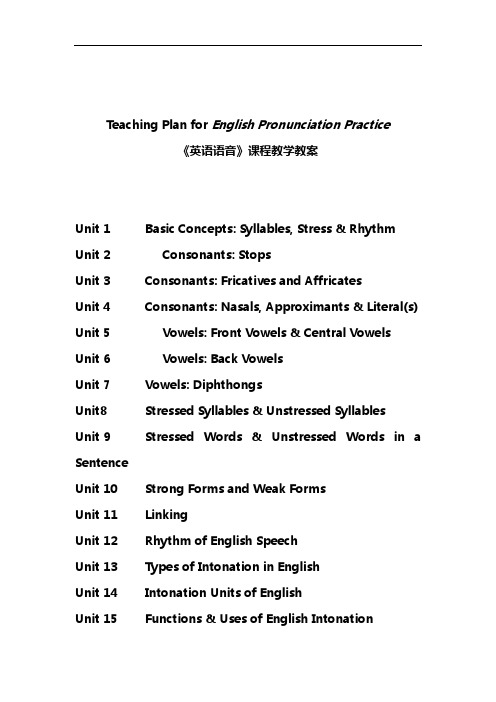
Teaching Plan for English Pronunciation Practice《英语语音》课程教学教案Unit 1 Basic Concepts: Syllables, Stress & Rhythm Unit 2 Consonants: StopsUnit 3 Consonants: Fricatives and AffricatesUnit 4 Consonants: Nasals, Approximants & Literal(s) Unit 5 Vowels: Front Vowels & Central Vowels Unit 6 Vowels: Back VowelsUnit 7 Vowels: DiphthongsUnit8 Stressed Syllables & Unstressed SyllablesUnit 9 Stressed Words & Unstressed Words in a SentenceUnit 10 Strong Forms and Weak FormsUnit 11 LinkingUnit 12 Rhythm of English SpeechUnit 13 Types of Intonation in EnglishUnit 14 Intonation Units of EnglishUnit 15 Functions & Uses of English IntonationUnit 1Lesson PlanBasic Concepts: Syllables, Stress & Rhythm(教案:附要点、重点和难点)Date: Sept.16-20Class: Classes 1, 2 & 3, Grade 2002Subject: English Pronunciation PracticePurpose:The students will learn some basic concepts in English pronunciation. We are going to learn something about syllables, stress and rhythm in English. At the same time, they will learn to say greetings and farewell with appropriate pronunciation and intonation in English.Objectives: Students will be able to :1.Define - in their own words a definition for “syllable”and“stressed syllable”, then a definition for “rhythm”and“rhythmic pattern”;pare – based on the understanding of the basic concept,compare the degrees of stress and different rhythmicpatterns;3.Practice –imitate the typical stress patterns and rhythmicpatterns in English.Resources/Materials:1.Textbook: Wang, Guizhen, An English Pronunciation Course,Higher Education Press, Beijing, 2000;2.Handouts: illustration of stress patterns and rhythmic pattern;3.Recordings of native speakersActivities and Procedures:1.Begin by asking the class to find out how much the students knowabout stress patterns and rhythmic patters in English, make sure that it serves the purpose of stimulating the students to think about the issue and have the desire to find out the answers themselves.2.Display examples by playing the recording of the native speakersshowing the typical stress patters and rhythmic patterns in English.3.Ask the students to listen to the tapes to mark out the stressedsyllables in words.4.Ask the students to listen to the tapes to mark out the stressed wordsin sentences.5.Have the students imitate the stress patterns and rhythmic patterns toexperience the rhythm in speech.6.Have the students share what they have learned by reading out thepractice materials in pairs.7.Have the students listen to the conversations recorded by nativespeakers of English and try to get the rhythmic patterns in their speech.8.Have the students practice the guided conversation. Ask them to payspecial attention to the stress the rhythm in speech.9.Highlight the language function in the conversation in the practice.10.H ave several pairs of the students present their conversation in theclass.11.C omment on the students’performance by highlighting theachievement of the students and the efforts they need for the improvement.12.Ask the students to do more practice after class and get ready for presentationduring the next session.附: 要点、重点和难点Unit 1Basic Concepts: Syllables, Stress & Rhythm In this unit, we are going to learn some basic concepts in Englishpronunciation. We are going to learn something about syllables, stress and rhythm in English. At the same time, we are going to learn to say greetings and farewell with appropriate pronunciation and intonation in English.First of all, let’s look at the syllable in English.Please listen to the following word: driveway.Now, tell me, how many syllables there are in this word? Right. There are two.Please listen to the following sentence: Drive him away.Tell me, how many syllables there are in this sentence? Right. There are four.IntroductionSo. What is a syllable?A syllable is a word part and the basic unit of English rhythm. English words can have one, two, three or even more syllables. In the word ‘driveway’, there are two syllables. In the sentence ‘Drive him away’, there are four.What is a stressed syllable?In English words with more than one syllable, one of them will receivemore stress than the others. Stressed syllables are those that are marked in the dictionary as stressed. For example, in the word ‘driveway’, the first syllable is a stressed syllable while the second syllable is not.Stressed syllables in English are usually longer, louder, and higher in pitch.Listen to the following example:ba NAAAA naSyllable 1 Syllable 2 Syllable 3(short) (long) (short)The word "banana" has 3 syllables. Syllable 1 is not stressed and so is short. Syllable 2 is stressed and so is long with a clear vowel sound / :/. Syllable 3 is not stressed and so is also short.Here is a short summary about the stressed and unstressed syllables: Stressed syllables are strong syllables. Unstressed syllables are weak syllables.Stressed syllables:-are long-have a pitch change-have full vowel sounds.Unstressed syllables:-are short-often have a reduced vowel sound.Now let’s look at the rhythm in English.We all know that correct pronunciation of the individual English sounds is important in communication. The way the sounds are organized, however, is often more crucial for understanding. The rhythm of English, for example, is one of the two major organizing structures that native speakers rely on to process speech.What is rhythm?Rhythm can be found everywhere in life: the sound of a clock, the beating of the heart, the strokes of a swimmer, and of course in poetry and music. But rhythm in language is less familiar because it is less obvious. The rhythm of a language is characterized by the timing pattern of successive syllables. In some languages, every syllable is given about the same length, while in others, syllables vary in length. In English, strong beats are called stress -- the heart of the rhythmic pattern.第1单元基本概念:音节、重音与节奏本单元将向大家介绍英语语音语调的基本概念, 主要介绍英语语音的音节、重音和节奏规律。
荆州职业技术学院院级精品课《实用英语语音学》.
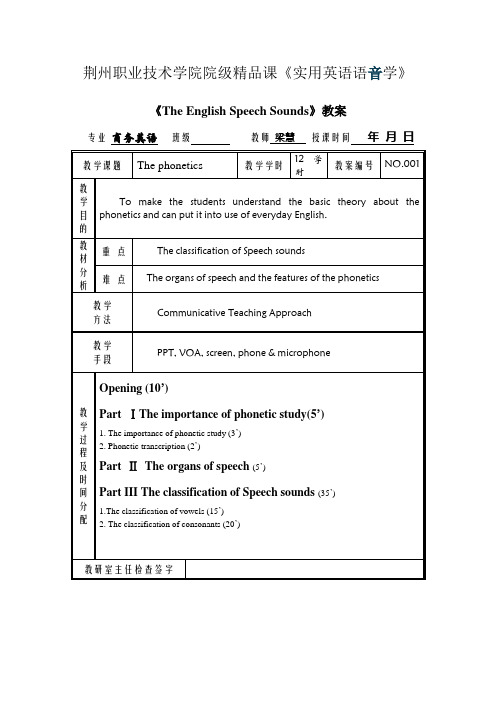
荆州职业技术学院院级精品课《实用英语语音学》《The English Speech Sounds》教案专业商务英语班级教师梁慧授课时间年月日Part 1The importance of phonetic study1)Phonetics is the science of speech sounds. It deals with the sound system of alanguage. A language consists of three important elements, namely, speech sounds, vocabulary and grammar. Speech sound is the material form on which word and grammar rely for existence. Divorced from speech sound, word and grammar are non-existent. So the first step in studying any spoken language is to determine the phonemes.(Basic sounds)A basic sounds is the smallest phonetic unit of language. .e.g. the word “tea” iscomposed of two sounds /t/ and /i:/. Basic sounds are capable of distinguishing one word from another, or one grammatical form from another of the same word.E.g.: bed , bad, bid .It is clear from all these examples that basic sounds are distinctive. Any language has a number of speech sounds, yet basic sounds are limited in number.English phonetics covers the articulation, classification, and combination of the English speech sounds. It also deals with the laws of their changed, the rules of stresses and the intonation in English speech. Therefore, to study English phonetics is also the first step in mastering the theoretical knowledge of the English language. 2)As means of communication by word of mouth, language is used in oral speech and in reading aloud. Therefore, in order to make oneself easily understood while expressing one’s own or other people’s thoughts in any language, one must be able to pronounce sentences in that language quite correctly. One must have good pronunciation in order to be able to understand other people easily when they speak or read aloud. This is proved by the well-known fact that the better we pronounce a foreign language, the easier we understand it when we hear it. Phonetic transcription.In English there is a considerable difference between the pronunciation and the spelling of words1)One sound is often spelt in a number of different ways: pity busy village, inwhich some letters all stand for the same vowel /i/.2)One letter often stands for different sounds in different words: china father bad,in which the letter a stands for different vowel sounds.3)Many letter are not pronounced at all as in knock doubt comb4)The same spelling may have two different pronunciations according to differentmeanings: bow and tear.5)Words spelt in different way may have same pronunciation. E.g. peace andpiece. Know and no.In ordinary English spelling it is not always easy to know what sounds the letters stand for. In order to know which sound to use in a given word or sentence, it is necessary to construct a set of symbols to accurately represent the sound of actual speech. This set of symbols is called phonetic transcription. The modern phonetictranscription that is most widely used now is the International Phonetic Alphabet. The characteristic of this transcription is that each symbol must always represent one sound and never any other and one sound must be represented by only one symbol.AHD表示美语发音,The American Heritage Dictionary of the Engl ish Language(简称AHD)KK音标是一套(注音符号系统),是由John Samuel Kenyon 和Joh n Albert Knott两位美国学者共编著的发音词典A Pronouncing Di ctionary of American1956中用于标注美式发音的符号系统, 这是一套最常用的也是最权威的注音法,从此人们把美语标准发音惯称为KK音标。
- 1、下载文档前请自行甄别文档内容的完整性,平台不提供额外的编辑、内容补充、找答案等附加服务。
- 2、"仅部分预览"的文档,不可在线预览部分如存在完整性等问题,可反馈申请退款(可完整预览的文档不适用该条件!)。
- 3、如文档侵犯您的权益,请联系客服反馈,我们会尽快为您处理(人工客服工作时间:9:00-18:30)。
Chapter 3
Liaison
If we want to speak English fluently, we must try to avoid pronouncing each word as if it were isolated. We must try to link words together smoothly and naturally. In English one word is not separated from another by pausing or hesitating; the end of one word flows straight on to the beginning of the next, e.g.
First of all /'fә:st◡әv ◡ 'ɔ:l/
Some of us /'sΛm◡әv◡әs/
The linking of words in connected speech may be divided into the following types:
1)when the final sound of the word before is a consonant you must link the final consonant to
the initial vowel sound of the next word. It will help if you treat the final consonant as if it were transferred to the next words.
Examples: put it on /'puti'tɔ n/
look at it /'lukәtit/
think of it /'θiŋkәvit /
2)When the final sound of the word before is a vowel you must link the vowel sound to the
initial vowel should of the next word. Here a short and gentle /j/ or /w/ is used.
a)after /i:/, /i/ and the diphthongs(双元音) /ei, ai, ɔ i/,which end in /i/,we can use a very gentle
/j/ as the link.
Examples: the other /ði◡j◡'Λðә/
he is my uncle. /hi:◡j◡ iz mai◡j◡'Λŋkl/
she ate some./ʃ i:◡j◡әt sәm/
However, we do distinguish between “my ears” and “my years”, etc. “years”/jiәz/ has a longer and stronger/j/ than the shorter and gentle link /j/ before “ears”.
b)After /u:/, /u/ and the diphthongs /әu, au/, which end in /u/, we can use a gentle /w/ as the link.
Examples: two others /'tu:◡w◡'Λðәz/
do it /'du: ◡w◡it/
how old /'hau◡w◡'әuld/
Again we distinguish between “two-eyed” and “too wide”: /'tu:◡w◡'aid/, /'tu:'waid/
3)When a word ending with “r” or “re” goes before a word beginning with a vowel sound /r/ is
usually pronounced as a link.
Examples: for ages /fәr 'eiʤiz/
her own /hә:r 'әun/
share out /'ʃεәr 'aut/
far away /'fa:rә 'wei/
However, there are special circumstances in which a final “r” is silent even when the following word begins with a vowel.
a) When there is a /r/ in the same syllable, e.g.
a roar of laughter /ә 'rɔ : әv 'la:ftә/
a rare animal /ә 'rεә'æniml/
nearer and nearer /'niәrәәn 'niәrә/
b)when a pause is permissible between the two words (even if no pause is actually made) .e.g.
He opened the door and walked in.
/hi: 'әupnd ðә 'dɔ:әnd 'wɔ:kt in/
4)some English people link a final /ә/ or even /a:/ and /ɔ:/ to an initial vowel in the same group
by inserting a /r/ sound even if there is no letter r in the spelling. The /r/ sound added in this way is called “intrusive r”. Its existence should be known but not imitated.
Examples:
China and Japan /'ʧainәr әn(d) ʤә'pæn/
drama and music/'dra:mәr әn(d) 'mju:zik/
law and order/'lɔ:r әn(d) 'ɔ:dә/
I saw a man /ai 'sɔ:r ә 'mæn/。
